
10 research tools every PhD student needs
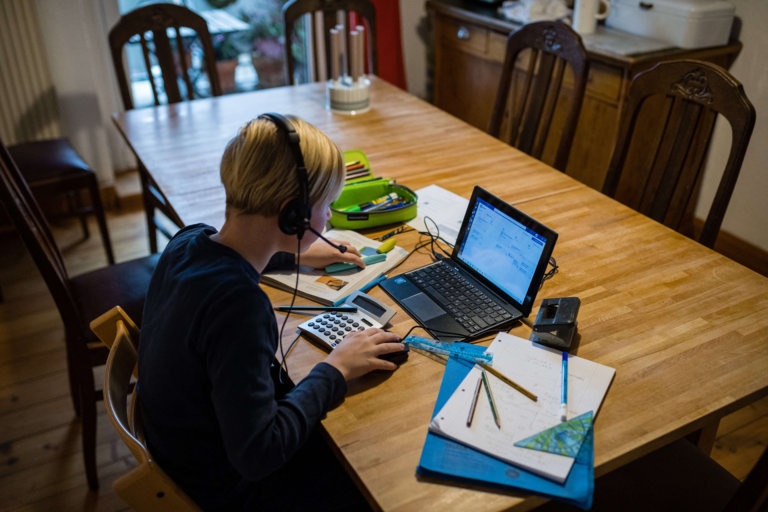
A PhD is the penultimate academic degree. With their research that looks into solving critical world issues, PhD graduates help everyone understand the world around them better; hence the important role of research tools that help them achieve this.
A PhD requires candidates to collect and gather data for their dissertation so they can make an informed analysis of whether their hypothesis is supported, as well as deduce future probabilities and trends. This is often a time-consuming process – one has to search from the library and internet for literature, conducting experiments, writing and publishing papers, on top of the tedious task of formatting these sources .
Since a dissertation can be upwards of 60,000 words, how then to efficiently collect and compile everything? Now that the world has become increasingly advanced in terms of technology, it makes sense to know how to use the many available online tools to help with the research process.
The right tools can help save time, effort and energy, helping you produce more accessible and visually presentable as well. You can even enjoy a better work-life balance since these tools will ease the long-drawn research.

These research tools can help free up precious time to concentrate on your PhD dissertation-writing. Source: Marc Wattrelot/AFP
Helena Hartmann – currently obtaining her PhD at the Social, Cognitive and Affective Neuroscience Unit in Vienna, Austria – has compiled a useful list of research tools for PhD students. Many have found the list infinitely helpful (“superb,” “made my day”) and that is why these 10 top research tools that every PhD student needs are highlighted here in no particular order.
Research Tool 1: Journal Rater
Have you ever struggled to choose a journal to send your research paper because when you are not sure which journal has good or bad reviews? The Journal Rater by @PhDVoice does that tiring guess-work for you.
This easily accessible database has ratings about the quality of the reviewers, the speed of the peer-review and publishing process and whether you should submit to a particular journal, among others. You can even include your comments and experiences, and choose to be anonymous as well; the best part is you know exactly which journals are great to submit.
Research Tool 2: Connected Papers
When you are doing a literature review and want to find connections between published papers, Connected Papers by @ConnectedPapers can help you do that. By entering a typical paper there, they will show a visual graph of similar papers in your field.
The more you explore, the more likely you can see trends, popular works and dynamics in your field. With more new papers published every day, Connected Papers helps you keep abreast of these important papers; you can also access their Prior Works to search for ancestor works in your field and Derivative Works for literature reviews of your field.
Research Tool 3: Citation Diversity Statement
Citation bias means having a tendency for a research investigation that shows benefit to be quoted more than those neutral or negative ones. Another definition is a scientist tending to cite research articles published in their preferred journals more frequently.
Checking and clearly indicating the proportion of male and female first and last-name authors can be a tiring. Using this citation diversity statement by Zurn et al is a helpful tool to reduce citation bias; you can easily append this simple and effective statement to your paper as well.
Research Tool 4: CRediT
CRediT (Contributor Roles Taxonomy) aims to recognise individual author contributions while reducing authorship disputes and enhancing collaboration. Through CRediT, authors can accurately show and describe their varied contributions to the published work.
Here’s how it works: the corresponding author should confirm the descriptions are accurate and that all the authors have agreed on this; the various roles are listed according to the categories. The CRediT statement should be given at the time of submission – this will then appear above the acknowledgement section of the published paper.
Research Tool 5: Unpaywall – OpenAccess
Unpaywall is an open database of 30,887,744 free scholarly articles from over 50,000 publishers and repositories. That means you can easily find, track and use this Open Access content; it is completely legal.
Unpaywall uses the DOI function to search for articles published in peer-reviewed journals; in fact Unpaywall has already been integrated into many worldwide library systems, search platforms and other information products. To use Unpaywall, go to any closed access article, click on the green button and you can get an Open Access version.
Research Tool 6: Create your own website
Any academic wanting their research and publications to be easily found should consider making a website. Hartmann found Dan Quintana’s Twitter thread tutorial on making websites easy and invaluable – see Hartmann’s website here.
In one hour, Quintana will show you how to make a website for free. All you need is a @github and @netlify account, and the downloaded @code – and your website with all your research and publications will be up and running in no time.
Research Tool 7: Excel Journal Database
If you want to have an easy compilation of your literature review sources, Stephen McQuilliam ’s Excel Journal Database Webinar can help you in this aspect . In this Youtube video, McQuilliam explains step by step how to build an Excel database to organise your notes and bring them together for your writing.
Research Tool 8: APA Word Template
For researchers, having to format their papers in APA can be an arduous process. Fortunately, Nicolás F. Narvaez Linares’ tip may make many researchers sigh with relief.
In Microsoft Word, just type APA in the New Document Tab, and the APA template automatically pops up. A word of caution: this template uses the 6th edition of the APA so you may have to make some changes since the APA has now released its 7th edition.
Research Tool 9: Notion
If you have many applications and want to keep them all in one place, Hartmann considers Notion as the best one. Basically Notion acts as an all-in-one workspace – you can keep your notes, tasks, wikis and databases there in Notion.
Research Tool 10: Canva
Finally, this design website is excellent if you have to prepare slides and figures for your presentations. The free, professional and nice designs can make your presentations more visually appealing.
Popular stories
Life sciences at manchester metropolitan university: new building, greater opportunities.

Purdue University: Future-proof your career in industrial engineering

A short guide to what two-year degrees are all about

Diploma courses in Australia: The best, the easiest, and the cheapest

10 PhD scholarships in the UK for international students 2022

Research supervisor feedback: How to make it constructive
How to: not fail your PhD studies
An official website of the United States government
Here's how you know
Official websites use .gov A .gov website belongs to an official government organization in the United States.
Secure .gov websites use HTTPS. A lock ( Lock Locked padlock ) or https:// means you've safely connected to the .gov website. Share sensitive information only on official, secure websites.
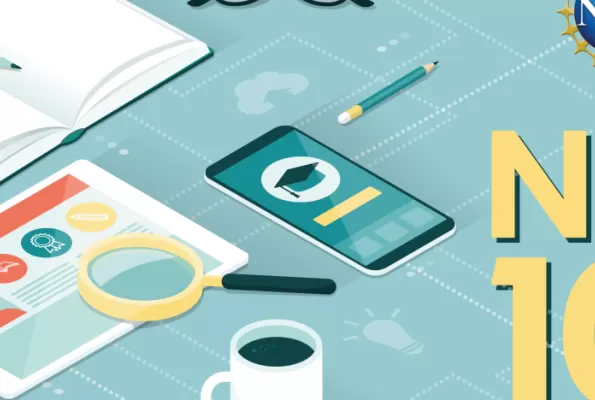
NSF 101: Graduate and postdoctoral researcher funding opportunities
The U.S. National Science Foundation supports research opportunities and provides stipends for graduate students and postdoctoral fellows and scholars.
There are multiple ways to find these programs, including the funding search on NSF’s website and the NSF Education & Training Application , which is growing its list of opportunities for graduate students and postdoctoral scholars.
To help begin your search, opportunities for graduate students and postdoctoral researchers are listed below. The principal investigator, or PI (a researcher who oversees a project), is often listed on these grants, along with their graduate students or postdoctoral researchers.
Graduate Student
While funding for graduate students is often included in a PI’s research proposal, the following opportunities are also available for early career researchers.
- Doctoral Dissertation Research Improvement Awards/Grants (DDRI/DDRIG) These programs help fund doctoral research in a variety of fields to help provide for items not already available at the academic institution. The funding provided cannot be used for items such as, but not limited to, tuition, stipends, textbooks or journals. The monetary amount listed in each DDRI/ DDRIG section does not include indirect cost associated with the project. The doctoral student should be listed as a co-PI on the grants with their advisor listed as the primary PI.
Archaeology Program- DDRIG : This program supports doctoral laboratory and field research on archaeologically relevant topics, with the goal of increasing anthropologically focused understanding of the past. Awards provide funding up to $25,000 per awardee.
Arctic Science Section DDRIG : The Arctic Sciences Section offers opportunities for DDRI proposals in the following programs: Arctic Social Sciences supports research in any field of social science. Arctic System Science supports projects that address the relationships among physical, chemical, biological, geological, ecological, social, cultural and/or economic processes to advance our understanding of the Arctic system. Arctic Observing Network supports projects focused on scientific and community-based- observations; development of in situ or remote sensors and automated systems; design and optimization of coordinated and scalable observation networks; and management of Arctic Observation Network data, data accessibility and data discovery. Awards provide funding up to $40,000 for a maximum of 3 years.
Biological Anthropology Program- DDRIG : This program supports research on human and non-human primate adaptation, variation and evolution. Awards provide funding up to $25,000 for up to two years.
Cultural Anthropology Program- DDRIG : This program supports research that is focused on cultural anthropology research, including topics such as: Sociocultural drivers of anthropogenic processes (i.e., deforestation, urbanization); resilience and robustness of sociocultural systems; scientific principles underlying altruism, conflict, cooperation, and variations in culture and behaviors; economy, culture migration and globalization; kinship and family norms. Awards provide funding for up to $25,000 for up to two years.
Decision, Risk and Management Science DDRIG : This program supports research on decision, risk and management sciences. This includes research in the areas of judgement and decision making; decision analysis and decision aids, risk analysis; perception and communication; societal and public-policy decision making; and management science and organizational design. Awards are for a maximum of 12 months.
Economics DDRIG :This program provides funding for research focused on improving the understanding of the U.S. and global economy from macroscale to microscale, including all field of economics such as macroeconomics, microeconomics, econometrics, economic theory, behavioral economics and empirical economics.
Human-Environment and Geographical Sciences Program- DDRI : This program supports basic scientific research about the nature, causes and/or consequences of the spatial distribution of human activity and/or environmental processes across a range of scales. The program welcomes proposals for empirically grounded, theoretically engaged, and methodologically sophisticated, generalizable research in all sub-fields of geographical and spatial sciences. Awards may not exceed $20,000 in direct costs.
Linguistics Program- DDRI : This program supports research on human language, including syntax, linguistic semantics and pragmatics, morphology, phonetics, and phonology of individual languages or in general. Awards provide up to $12,000 for a maximum of two years.
Dynamic Language Infrastructure- DDRI : This program supports research on building dynamic language infrastructure, which includes describing languages; digitizing and preserving languages; and developing standards and databases for analyzing languages. Provides funding up to $15,000 for up to two years.
Graduate Research Fellowship Program This fellowship supports full-time master's or doctoral students earning their degree in a research-based program focused on STEM or STEM education. Students are the primary submitter for the fellowship. Fellows will be awarded a $37,000 stipend and $12,000 cost-of-education allowance for three years of the five-year fellowship. For tips on applying, see our previous NSF 101 article on the fellowship program .
Non-Academic Research Internships for Graduate Students (INTERN) Supplemental Funding Opportunity This supplemental funding opportunity is for graduate students funded by active NSF grants. PIs may submit for up to an additional six months of funding to allow students to participate in research internship activities and training opportunities in non-academic settings, such as the following: for-profit industry research; start-up businesses; government agencies and national laboratories; museums, science centers, and other informal learning settings; policy think tanks; and non-profit institutions. Students must have completed at least one academic year of their program. This funding request may not exceed $55,000 per student for each six-month period. A student may only receive this opportunity twice. In addition to the general INTERN opportunity, there are two topic-specific INTERN opportunities:
Non-Academic Research Internships for Graduate Students in Geothermal Energy Supplemental Funding Opportunity : This opportunity is provided by NSF in partnership with the U.S. Department of Energy's Office of Energy Efficiency and Renewable Energy. It maintains the same funding levels and requirements as the general INTERN program; however, funding may only be used for gaining knowledge, skills, training and experience in geothermal energy and technology.
- Research Internships for Graduate Students at Air Force Research Laboratory Supplemental Funding Opportunity : This funding opportunity is for students supported on an active NSF grant to intern at a Air Force Research Laboratory facility. AFRL has several potential technology directorates available for students at locations across the U.S.: Aerospace Systems (Wright-Patterson Air Force Base, Ohio), Information (Rome, New York), Materials and Manufacturing (Wright-Patterson Air Force Base, Ohio), Directed Energy (Kirtland Air Force Base, New Mexico), Munitions (Eglin Air Force Base, Florida), Sensors (Wright-Patterson Air Force Base, Ohio), Space Vehicles (Kirtland Air Force Base, New Mexico), 711th Human Performance Wing Training (Wright-Patterson Air Force Base, Ohio).
Mathematical Sciences Graduate Internship This summer internship is for doctoral students in mathematical sciences through a partnership between NSF and Oak Ridge Institute for Science and E ducation. It provides students who are interested in academic and non-academic careers with the opportunity to learn how advanced mathematics and statistical techniques can be applied to real-world problems. Participants in the internship will receive a stipend of $1,200 per week during the 10-week internship. In addition, there is travel reimbursement for up to $2,000 for those who live more than 50 miles away from their hosting site.
NSF Research Traineeship Program Graduate students can apply for this traineeship through their institutions, if available. These topics can range across the scientific spectrum. Current projects can be found by state .
Research Experiences for Graduate Students Supplemental Funding These awards provide additional funding for graduate students with mentors who have an active NSF grant. Currently funding is available through the following programs:
Cultural Anthropology provides up to $6,000 per student for research activities.
Human Environment and Geographical Sciences at Minority Serving Institutions and Community Colleges provides up to $7,000 per student for research activities.
Postdoctoral Scholars
Astronomy and Astrophysics Postdoctoral Fellowship This fellowship supports research investigating a field within astronomy or astrophysics for up to three years. The stipend is $75,000, with a fellowship allowance (i.e., expenses for conducting and publishing research, fringe benefits) of $35,000.
Atmospheric and Geospace Sciences Postdoctoral Fellowship This fellowship supports postdoctoral fellows in atmospheric or geospace sciences. Atmospheric science includes topics such as atmospheric chemistry; climate and large-scale dynamics; paleoclimate climate; and physical and dynamic meteorology. Geospace science focuses on aeronomy, magnetospheric physics and solar terrestrial research. This fellowship provides up to 24 months of support. The stipend is $70,000 per year, with a fellowship allowance of $30,000.
Earth Science Postdoctoral Fellowship This program supports the study of structure, composition and evolution, the life it supports and the processes that govern the formation and behavior of Earth’s materials. Researchers are supported for up to two years at the institution of their choice, including institutions abroad. The stipend is $65,000 per year, with a fellowship allowance of $25,000 per year.
Mathematical and Physical Sciences Ascending Postdoctoral Research Fellowships
This program supports postdoctoral fellows performing impactful research while broadening the participation of members of groups that are historically excluded and currently underrepresented in mathematical and physical sciences. This fellowship can last between one and three years. The stipend is up to $70,000 per year, with a fellowship allowance of $30,000 per year.
Mathematical Sciences Postdoctoral Research Fellowships This fellowship has two options:
- The Research Fellowship provides full-time support for any 18 months within a three-year academic period.
- The Research Instructorship provides a combination of full-time and half-time support over a period of three academic years, which allows the fellow to gain teaching experience. Both options receive up to $190,000 over the fellowship period. The full-time stipend is $5,833 per month and the part-time stipend is $2,917 per month. In addition, the fellow will receive $50,000 in two lump sums ($30,000 in the first year and $20,000 in the second year) for fellowship expenses.
Ocean Sciences Postdoctoral Research Fellowships This fellowship supports research in topic areas such as: biological oceanography, chemical oceanography, physical oceanography, marine geology and geophysics, ocean science and technology. This two-year fellowship with a stipend of $67,800 for the first year and $70,000 for the second year, with a fellowship allowance of $15,000 per year.
Office of Polar Programs Postdoctoral Research Fellowships This fellowship supports postdoctoral research in any field of Arctic or Antarctic science. This two-years fellowship, with a stipend of $67,800 for the first year and $70,000 for the second year, with fellowship expenses of $15,000 per year.
Postdoctoral Research Fellowship in Biology The Directorate of Biology offers a fellowship for postdoctoral researchers in one of three areas:
- Broadening Participation of Groups Underrepresented in Biology. This area requires a research and training plan that is within the scope of the Directorate for Biology and that enhances diversity within the field.
- Integrative Research Investigating the Rules of Life Governing Interaction between Genomes, Environment and Phenotypes. This area aims to understand higher-order structures and functions of biological systems. Research should use a combination of computational, observational, experimental or conceptual approaches.
- Plant Genome Postdoctoral Research Fellowships. This area has a broad scope and supports postdoctoral training and research at the frontier of plant biology and of broad societal impact. Highly competitive proposals will describe interdisciplinary training and research on a genome wide scale. The fellowships are for 36 months and have a stipend of $60,000 per year, with a research and training allowance of $20,000 per year.
SBE Postdoctoral Research Fellowships This fellowship supports postdoctoral research in the social, behavioral and economic sciences and/or activities that broaden the participation of underrepresented groups in these fields. Funding is up to two years and has two tracks available:
- Fundamental Research in the SBE Sciences. This track supports research focused on human behavior, interaction, social and economic systems.
- Broadening Participation in SBE Sciences. This track aims to increase the diversity of post-doctoral researchers in the social, behavioral and economic sciences. In addition to the research proposal, these applications should also answer the question: “How will this fellowship help broaden or inform efforts to broaden the participation of underrepresented groups in the United States?” The stipend for this program is $65,000 per year (paid in quarterly installments) and the research and training allowance is $15,000 per year.
SBIR Innovative Postdoctoral Entrepreneurial Research Fellowship This fellowship supports postdoctoral researchers at start-up companies through the Small Business Innovation Research program. By recruiting, training, mentoring, matching and funding these early-career scientists, this fellowship addresses the need of doctoral-level expertise at small, high-tech businesses. The base stipend is $78,000 per year with optional individual health and life insurance, relocation assistance (company dependent), professional conference travel allowance, and professional development funds.
Science, Technology, Engineering and Mathematics Education Individual Postdoctoral Research Fellowship This fellowship is for postdoctoral researchers to enhance their research knowledge, skills, and practices of STEM education research. If the fellowship is granted, the fellow is expected to remain affiliated with the host organization and PI sponsoring them. The fellowship can last up to two years with an annual stipend of $70,000, with fellowship expenses of $15,000.
Multilevel
CyberCorps® Scholarship for Service This program is for students earning their associates, bachelor's, master's or doctoral degree in cybersecurity. A stipulation of the program is that the recipients must work after graduation in a cybersecurity mission of the federal, state, local or tribal government for an equal amount of time as the scholarship's duration. It will provide full tuition and fees plus a stipend of $27,000 per academic year for undergraduates and a stipend of $37,000 per academic year for graduate students, in addition to a professional allowance of $6,000 for all levels.
NSF-NIST Interaction in Basic and Applied Scientific Research This supplemental funding request is for NSF-supported researchers to collaborate with researchers at a National Institute of Standards and Technology facility. It can be used for travel expenses and per diem associated with on-site work at NIST. It is available for NSF-supported PIs, co-PIs, postdoctoral scholars, graduate and undergraduate students and other personnel associated with the research. PIs should contact their NSF program director for their award before applying.
This extensive list shows the ways in which NSF helps train the next generation of STEM researchers. If you are interested in learning more about any of these programs, reach out to contacts listed on the award webpages.
If you are interested in awards for high school students, undergraduates and post-baccalaureate scholars, check out our previous NSF101 for more information!
About the Author
Related stories.
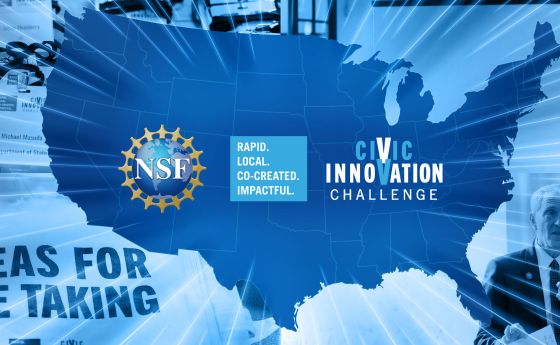
The competition empowering and transforming U.S. communities
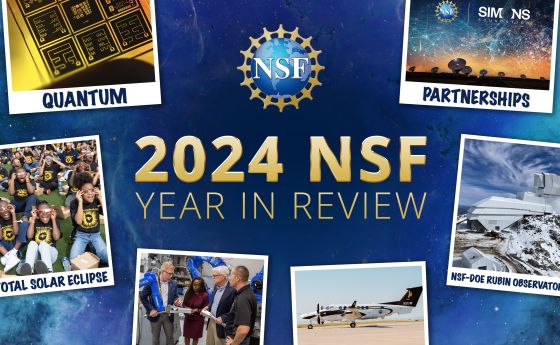
NSF 2024: Investing in the nation's scientific and competitive future
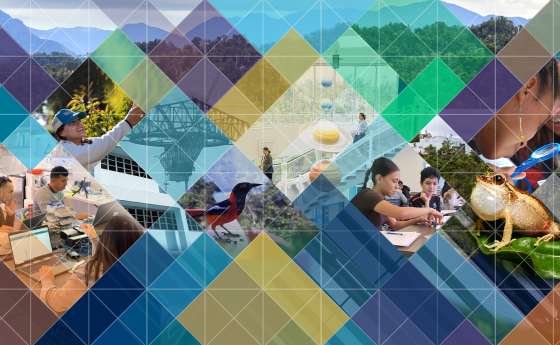
NSF Arecibo C3 Center bridges science and community in Puerto Rico

- Youth Program
- Wharton Online
Wharton Stories
7 resources to help phd students succeed on their doctoral journey.
It takes a village and a variety of skills to succeed in the doctoral world. Here are a few of the many resources Wharton Doctoral Programs offers to help.
Like most of our doctoral students, perhaps you’re preparing to go into academia after completing your PhD. Being a professor and researcher today often involves opportunities to share your research with a larger audience than a classroom of students. The doctoral journey is meant to prepare you with the wide array of skills you’ll need to be effective whether you’re in front of the classroom or a conference stage.
That includes the polish to present and speak publicly with ease, the writing and communication skills to craft your dissertation and journal articles, the analytical know-how to research thoroughly and gather meaningful data, and the ability to teach — colleagues, pupils, or the general public, whatever the case may be. And, if you have family, you’ll need support in getting them through this journey with you.
Wharton Doctoral Programs offers a wide range of resources to help you thrive in the PhD program and prepare you for life beyond it. Here are a few of the top Wharton resources our students have highlighted as most beneficial:
1. 5 Slides 5 Minutes
Researchers often have the opportunity to share their work with a larger audience through social media and mass media outlets — but it requires nuanced communication skills. How do you take complex findings and communicate them to a general audience concisely without oversimplifying the message?
That’s the focus of 5 Slides 5 Minutes. Launched in 2014, this low-stakes, high-potential event enables PhD students to present an abstract to students, faculty, and staff to practice engaging non-experts in their research topic. Students receive an invitation to participate via email from the Doctoral Programs Office.
After students present, they can work with Wharton Communications Program to review their presentation and get tips on how to improve their communication skills. Wharton’s renowned faculty also share valuable insights with students about these presentations.
“We focus on individuals. We help them convey their research content most effectively given their style and personality,” said Lisa Warshaw, Director of the Wharton Communications Program.
2. Dissertation Boot Camp
The name might sound intimidating, but some students think of Dissertation Boot Camp as a two-week writers’ retreat. Hosted twice a year by the Graduate Student Center, it’s designed for students who have dissertation status but haven’t presented their proposal yet.
The camp offers an environment and support for intense, focused writing time as well as a review on the steps, deadlines, and University policies. Limited to 20 students, the small group gives writers a chance to make connections with others who are going through the dissertation process and provides participants with the structure and motivation to overcome typical roadblocks along the way.
3. Wharton Communications Program
The Wharton Communication Program helps Wharton PhD students become more effective communicators and thus better presenters, public speakers, and writers — all critical skills in academia. All doctoral students are provided with access to on-site, one-on-one writing coaching during the academic year.
Wharton PhD students are required to attend two workshops: First-Year Communications Workshop in the fall and First-Year Writing Workshop in the spring. The skills-based approach adopted in the workshops helps students develop their personal style and strengthen their confidence as communicators.
Through multiple practice opportunities, video recording of speeches, and rigorous feedback, the program provides students with a thorough foundation in communication theory and for doctoral students, focuses on research presentations and job talks.
4. Teacher Development Program Workshop
Offered in conjunction with the Center for Teaching and Learning , the Teacher Development Program is a four-session course. It gives doctoral students a foundation in core teaching practices to support their teaching at Penn.
By helping with presentation skills and academic job placement, the workshop prepares students to become faculty in the future. Ian Petrie , Senior Associate Director, Center for Teaching and Learning described the workshop as “a collective, collaborative program.” Each week features “microteaching” demonstrations, where participants conduct a brief lesson and get feedback from their peers and the directors.
The intent is that faculty and graduate students will engage and learn from each other to master fundamental teaching methods. “Every PhD student can leave the program having gained some new tools for teaching,” Petrie said. This exchange happens when doctoral students observe “talented colleagues from other departments to get a glimpse of how they teach.”
Students also have the opportunity to enroll in the CTL Teaching Certificate program to hone teaching skills and grasp a commitment to developing as teachers.
“I’d like everyone to come out of the experience feeling more confident about their skills as an instructor or presenter,” Petrie said. “Anything I can do to support doctoral students in achieving their goals is extremely gratifying.”
5. Wharton Research Data Services (WRDS)
With more than 50,000 corporate, academic, and government users, Wharton Research Data Services (WRDS) is the global gold standard in data management, research analytics, and thought leadership. Researchers at more than 450 institutions in 36 countries across the globe depend upon this award-winning research platform and business intelligence tool — and researchers are doing the work to grow it right here on Wharton’s campus.
“The fact that the people who create the data, research analytics, and tools are here is super important,” said Prof. Cathy Schrand, Vice Dean of Wharton Doctoral Programs. “I’ve had early access to WRDS before it even became available to other subscribers. Top universities all over the world that have subscriptions to WRDS may only have access to certain elements of it, but we have access to all of it and it’s here on site which does provide an advantage.” The platform allows researchers to access more than 350 terabytes of data in one location that spans across multiple disciplines, including accounting, banking, economics, ESG (environmental, social, and governance), finance, health care, insurance, marketing, and statistics. “WRDS is by far the most important source of datasets for academic researchers. As a Wharton PhD student, you automatically get unrestricted access to every one of these databases,” said Itamar Drechsler, associate professor of finance at Wharton and NYU’s Stern School of Business, who has experience on both sides of the classroom – he earned his PhD from Wharton in 2009.
6. Wharton Behavioral Lab
A shared resource for all Wharton faculty, the Wharton Behavioral Laboratory (WBL) provides a variety of services that support data collection for behavioral research on business-related topics. The primary goal is to enhance the research productivity of Wharton faculty by minimizing the operational costs, both time and money, of conducting research. With two locations — one in Steinberg Hall Dietrich Hall and another in Jon Huntsman Hall, doctoral students can gather original data through lab experiments and panels, instead of using secondary data created by others. Each year, the lab collects about 23,000 subject hours of data. Research from WBL can consistently be found in national and international publications such as the Journal of Behavioral Decision Making, the Journal of Experimental Psychology: General, Proceedings of the National Academy of Sciences, the Journal of Neuroscience, Psychology, and Economics, and the Journal of Business Ethics .
7. Support for Families
For some PhD students, attending Wharton means relocating their families to a new city. To help students and their families ease the transition to PhD life, the Wharton Doctoral Program Office hosts the Maternity/Paternity Workshop , an annual event that talks about the resources available to PhD students with families.
Here are a couple of the key resources they highlight in the workshop:
- The Doctoral Programs Office allows eligible students to apply for up to one year of additional school-level funding beyond their allotted funded year. Furthermore, students are eligible for up to eight weeks of time-off for childbirth and adoption and have the option of taking unpaid Family Leave of Absence.
- At Penn, the Family Resource Center provides additional resources and facilities, such as a children’s playroom and two private lactation rooms, which cater to the needs of students with families. The Center also has two grant programs for PhD students to help offset the cost of childcare and family expenses, and health insurance for dependents.
- Wharton Doctoral Partners & Families is a student-run online resource created to communicate the resources at Penn and Philadelphia to partners and families. Its mission is to empower members to transition and settle into their new lives.
Posted: November 6, 2018
- Admissions and Applying
- The Wharton School
- Work/Life Balance
Doctoral Programs
Start your doctoral journey.
Whether you’re just starting your research on PhD programs or you’re ready to apply, we’ll walk you through the steps to take to become a successful PhD candidate.
Deciding to get a PhD
You might be surprised to find out what you can do with a PhD in business.
Is an Academic Career for You ? What Makes a Successful PhD Student
Preparing for the Doctoral Path
The skills, relationships, and knowledge you need to prepare yourself for a career in academics.
How the PhD Program Works How to Become a Successful PhD Applicant
Choosing the right program
What’s the difference between PhD programs? Find out how to choose one that fits your goals.
What to Consider When Choosing a Doctoral Program
Starting an application
Tips for a successful application process.
Application Requirements Preparing Your PhD Application
Related Content

This EMBA Dad Managed a Career Change and Welcomed Two New Children Before Graduation

Spending a Summer in Singapore To Conduct Social Impact Research

How Wharton Helped this Naval Aviator Change Coasts and Transition to the Private Sector

New Doctoral Symposium to Increase Dialogue on Innovation Research

EMBA Student Demonstrates the Benefits of Sponsorship at Work

How These Alumni Prepared for the GMAT, GRE, and EA

How Wharton is Adding Value for this Finance Executive

A Survival Kit for MBA Moms at Wharton

How an L.A. Doctor Multiplies Impact With Media Exposure and Business Insights

Prof. Arthur van Benthem Talks About the Intersection of Corporate Strategy and Government Energy Policy

Wharton EMBA Admissions Directors Share Tips on Writing Strong Essays

Roaming Rwanda: How GRIP Gave This Wharton Undergraduate A Glimpse Into Global Health

Improving Wellness at Wharton One Pitch at a Time

Father’s Day Reflections: EMBA Student Shares Advice for New Parents

Making Sense of Coronavirus Statistics
20 Best Research Methodology Books for Ph.D. Students

As a Ph.D. candidate, research methodology is of the utmost importance for the completion of your degree. Books on research can be an invaluable resource to Ph.D. students. These will help you with researching books, improving your planning, and help you to identify the most professional dissertation writers. If you would like to learn more about the best research books for Ph.D. students, then the following article will be your guide.
1. Research Design: Qualitative, Quantitative, and Mixed Methods Approaches, 4 th Edition
The hallmark of this textbook is that it describes and compares the three main types of research methodology as well as the writing involved. This makes it quite different to many other books and services targeting Ph.D. students. The world’s changing and most dissertation writing from Ph.D. writers from EDUbirdie are not focused on singular methods anymore. And that is what you will find in this book – insights, and support for any method that you are pursuing.
This makes it far easier to understand and select the concept that fits your study best. The textbook goes one step further by also having a philosophical conversation about research methodology. As such, it explores ethical and moral concerns, in addition, to logistical ones. This makes the book a great deal more well-rounded than its literary counterparts.
2. The Craft of Research, 3 rd Edition
Even works produced by top Ph.D. writing services can be difficult to understand, particularly for layman readers. This is because the thesis and resulting work haven’t been properly explained. This textbook helps to correct this by showing you how to properly outline your argument and the supporting evidence. In doing so, you will find that you are better equipped to write a more compelling paper.
3. Qualitative Inquiry and Research Design: Choosing Among Five Approaches, 3 rd Edition
If you are focused on qualitative research methodology, then this textbook should be at the very top of your list. It breaks down the main five approaches to a qualitative inquiry by looking at the fundamental elements of each one of them. The author offers even more support by giving you guidelines on constructing your ideas as well as improving the standard of your work.

4. Doing Your Research Project (Open Up Study Skills), 5 th Edition
This is the textbook that you should be reaching for if you want to get on the same level as good Ph.D. writing services. It is especially useful for those who have only just begun their Ph.D. journey. This textbook contains crucial information on the most basic of skills . This includes preparing for your research, drafting your paper, and putting the finishing touches on it.
6. The Essential Guide to Doing Your Research Project, 2 nd Edition
If you are feeling rusty regarding any of your research methodology, then this textbook can help you out. This is undoubtedly one of the more comprehensive books on research. All the stages of the research process are broken down and the text even includes summaries, glossaries, and much more.
7. Naturalistic Inquiry, 1 st Edition
If your research topic is based on the field of social science, then this is a top book for Ph.D. students. For one thing, it challenges traditional approaches and proposes more progressive and accurate forms of study. Following the concepts and advice of this book could lead to more accurate results.
8. Qualitative Research: A Guide to Design and Implementation, 4 th Edition
This book offers the latest insight into qualitative research. As such, you will be able to move your study and thesis into a new era. The text should also give you better insight into researching books for your thesis, creating a modern approach to your work.
9. The Research Methods Knowledge Base, 3 rd Edition
This is a great textbook, regardless of the field that you are in. It offers up comprehensive coverage of both qualitative vs quantitative research methods. The language in the book is equally accessible to both novices as well as professional dissertation writers. This book will help to clear up any questions or confusion you may have.
10. Introducing Research Methodology: A Beginner’s Guide to Doing a Research Project 2 nd Edition
As the name suggests, this is an excellent guide to those who are just starting out with their research project. Whether you need to brush up on the subject matter, improve your overall approach, or would like to create a more structured concept, this book will help you in all these areas. It will be like hiring your own dissertation writing services.
11. The SAGE Handbook of Qualitative Research, 4 th Edition
There is no denying that research needs to be more diverse than ever before. If this is a concept that you would like to include in your work, this textbook can help you. Here, qualitative research is given a social spin and is applied to more real-world terms. As such, it can improve the quality and accuracy of your current and future work.
12. The Foundations of Social Research: Meaning and Perspective in the Research Process
There is quite a bit of variation in schools of thought, terminology, and more when it comes to social research. This textbook takes the trouble to break all these down and discuss the discrepancy. In turn, this makes it far easier for you to get a more comprehensive understanding of your next step in researching books.
13. Essentials of Research Design and Methodology
If you want fuss-free assistance on selecting research and creating an efficient research plan, this textbook will help you out. There is a lot of information available in data collection, assessment strategies, interpretation methods, and more.
14. Introduction to Quantitative Research Methods: An Investigative Approach
In case you are having trouble grasping various concepts of quantitative research methods, you will find this book rather useful. This is because the authors take a different approach to handling these topics. They tackle each concept like detectives and use real-world problem-solving schematics. Thus, it functions as an excellent Ph.D. writing service.
15. Research Justice
For research to be applicable to a real-world scenario, it must appeal to all demographics. This book shows you how to create a thesis and carry out research so that you are creating a more diverse group of participants. In doing so, you make your research far more relevant by modern standards.
16. Single Case Research Methodology, 3 rd Edition
It doesn’t matter if you are a Ph.D. student, researcher, or even a professional practitioner. This book will guide you through all aspects of single case research methodology. With the help of this text, you can conduct single-case design studies, interpret findings, write proposals, and a whole lot more.

17. Qualitative Dissertation Methodology: A Guide for Research Design and Methods, 1 st Edition
One of the more useful aspects of this book is that it is based on actual students’ experiences. Thus, it adequately tackles all the obstacles that you may come across when researching books, writing proposals, or doing actual research. The book breaks down all elements of qualitative research into smaller parts, making it more manageable for students.
18. Research and Publications Planner: The Graduate Student’s Guide to Publishing Academic Research
This book is written by a graduate student. Thus, it appreciates the real-world struggles of coming up with research ideas and then executing your vision. The book guides you through every step of the way, making it easy for you to structure and organize your work so that you are creating a more cohesive document.
19. Doing Academic Research: A Practical Guide to Research Methods and Analysis
This book is suitable for students that are looking for books on research in any field. It doesn’t matter if you are humanity, business, or social science – this book will appeal to you. As the title suggests, this is a practical guide. Therefore, it will provide you with relevant information and assistance every step of the way.
20. Case Study Research and Applications: Design and Methods, 6 th Edition
If you are engaged in case study research, then you should check out this book. This is because it uses numerous real-world case studies to give you a clearer idea of how to write, analyze , and come to your own conclusions with your current work. The writer also offers up suggestions for improvements as well as how to improve the accuracy of your research.
21. Research Methods: A Practical Guide for Students and Researchers
This book allows you to do research in an organized and concise manner. It starts from the very beginning of your research process and gives you tips and suggestions that are useful at every stage. Furthermore, it gives you real-world examples to describe what is being explained in the book. This is a suitable option for students across all disciplines.
These are the top research methodology books for Ph.D. students to invest in. It doesn’t matter what discipline you are in or what kind of research you are doing. You can guarantee that at least one of these books will give you the guidance and answers that you are looking for.
RELATED ARTICLES MORE FROM AUTHOR

7 Tips on Building a Strong Professional Network

Driving Success: Integrating CRM Strategies into Your Marketing Plan

The Ultimate Guide To Write College Papers Of High Quality

Leveraging Technology and Online Resources to Provide Personalized Care for Seniors

Defining Facial Features Without Surgery: Contouring with Morpheus 8

Director’s Note: Celebrating 11 Years Of Innovation, Empowerment, And Growth
Leave a reply cancel reply.
Save my name, email, and website in this browser for the next time I comment.
- Another Degree of Success
- Graduate School Blog
The Importance of Research for Your PhD
Conducting research in a PhD program is one of the most defining and important aspects of pursuing a Doctor of Philosophy. A PhD is a research degree that provides the challenging but rewarding opportunity to contribute to and expand your field of study.
One of the most difficult parts of PhD research projects is figuring out what research question you should ask and how to develop an original and engaging topic.
Here’s our walkthrough for finding the right PhD research project and successfully navigating the research process.
Choosing the Right PhD Research Project
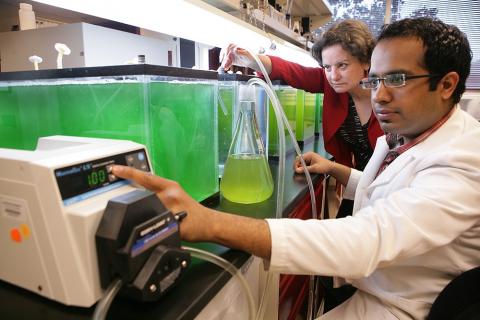
Consult with Faculty
When beginning your PhD program, you likely had a broad dissertation topic idea in mind. Now, you’ll need to narrow your focus and turn it into a manageable research question.
Identify a faculty member or two who have similar interests and meet with them to discuss your ideas and the existing scholarship. Remember, faculty are an invaluable resource — use their expertise wisely! They know what research has been conducted already, and understand where future research is trending.
Review the Existing Scholarship
A serious literature review will tell you where your PhD research will fit within the current scholarship. You need to know what’s been written so far, the research trends, and ultimately if your PhD research project is original and how it will contribute to the intellectual conversation.
A literature review shouldn’t be done through reading alone — though you will do a lot of reading! Be sure to talk with other scholars and attend seminars and conferences, both at your university and beyond.
Getting involved in a conversation about the future of your field and talking about your ideas as much as possible are crucial parts of choosing a good research topic.
Identify What’s Doable
Your criteria for selecting a research topic should include travel and research costs, availability of sources and resources, and time constraints. After all, you want to finish your dissertation in this lifetime, right?
A dissertation research topic that is a good fit for you will be manageable, original, and able to take you to the research frontiers of your discipline.
Motivation Matters
Your PhD research project will consume your life for the next three or four years, so make sure that your dissertation topic is one you’re passionate about.
Yes, there will be days you’ll feel less enthusiastic about working on your dissertation — that’s all the more reason to start out with a topic that genuinely interests you.
Ask yourself: Will I still enjoy doing this research and discussing it two, three, four, 10 years from now? The answer should be “yes!”
Conducting Your PhD Research
You’ve started to understand the current literature, determined how to conduct your research, examined your topic in classes and with your advisor, and narrowed your topic. Now, it's time to start digging deep.
Seek Feedback
While researching, it’s very easy to get sucked into your work and isolate yourself in the academic ivory tower. Don’t do it! The best way to do research in a doctoral program is to maintain an open dialogue with your advisor, your fellow students, and the broader community.
Communication is a vital part of PhD research projects, and discussing findings and bouncing ideas off of people can lead to new insights and constructive feedback. You should also present your ongoing research and findings as often as possible. When you share your research developments, you can gauge the response of others in your field and adjust your focus as needed.
Expand Your Resources
Along with soliciting feedback from professors and peers, seek out funding in the form of grants and travel support. There’s a host of grants available for doctoral research through national, regional, and more local organizations.
Identifying and securing funding for research will display your project management skills to future employers, and is an important part of your development as a professional in your field.
If you’re aiming for a career in academia, your ability to secure grants will be tied to landing that first job and to advancement through the faculty ranks.
Don’t be afraid to look beyond what’s available to you on campus. Write grants, apply for travel funds, and find other ways to venture out and broaden your research.
Stay Open to Change
Finally, remember that the topic that you painstakingly refined may change completely, and that’s definitely not a bad thing. Once you start getting into the data and primary sources, you’ll learn new information and make discoveries that will shift your thinking. This evolution of the topic can be confusing and challenging at times, but your scholarship will be all the better for it.
Why Is Research so Vital?
Choosing the correct PhD research project is no easy feat. It will influence your PhD experience and career trajectory. When determining your PhD research focus, do not make the decision lightly. Doctoral research projects fuel the academic and technological developments of our global community.
Educate yourself on the current pillars of thought that exist within the field already, and communicate extensively with faculty members, student peers, industry professionals and scholars in the field. That will help you pick a research project that truly interests and invigorates you.
When you find yourself having doubts on the long hours you’re putting into your dissertation, remember that your research project is about more than just getting a degree. You’re contributing to the global accumulation of knowledge, and that knowledge is put to use in astounding, innovative, and groundbreaking ways.
Whether you work on advancements in chemical engineering that teach us new ways of recycling waste, or a re-imagining of societal structures in the Francophone world, doctoral research is vital to our collective betterment as a society. So, let your passion for research direct the changes in our community.
Learn 13 Tips to Help You Write a Great Ph.D. Dissertation >
- Graduate School

Keep Exploring
Meet outstanding master’s in psychology graduate kris-ann anderson.
Kris-Ann Anderson has been selected as one of the five finalists for the Fall 2021 Alumni Association Outstanding Master’s Graduate Award. She was nominated for the award by the Department of Psychology in the College of Liberal Arts.
Finding the Key to Success: Computer Science PhD Candidate Bhaskar Ghosh Helps AI Algorithms Improve Their Performance

- Request Information
- Visit Campus
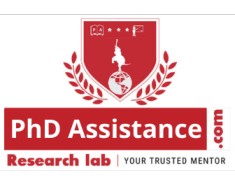
Navigating the Maze: Effective Research Strategies for Early PhD Students
Introduction.
Commencing a PhD journey can be likened to making a foray into the labyrinth of knowledge, where every twist and turn tends to present novel opportunities and challenges. For students who have just started their PhD journeys (early students), the journey on the whole can evoke a sense of overwhelming. However, armed with the appropriate strategies, it can be navigated effectively. Research forms the crux of all PhD research attempts, and sharpening your research skills right from the beginning would be vital for success. The purpose of this blog is to deep-dive into effective research strategies that are customized particularly for early Ph.D. students.
Effective Research Strategies
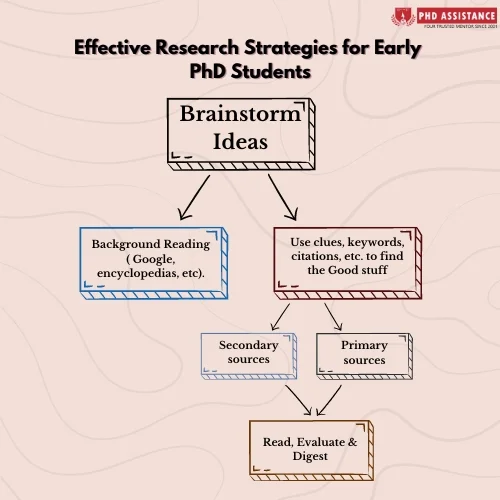
1. Outline your Research Goals
Prior to diving headlong into your research process, it would be imperative that you clearly outline your research goals (Singh, 2021). You need to know what you intend to realize through your research and what questions you seek answers to. Specific and well-focused research will help direct your efforts and keep you on track throughout your whole Ph.D. journey .
2. Establish a Robust Foundation
You need to develop a robust knowledge base in your research domain. The trick to doing this would be to conduct an extensive reading of relevant research papers. By reading through relevant research and scholarly papers, you will be able to acclimatize yourself to seminal works, recent developments, and key theories (Aukerman & Chambers Schuldt, 2021). Such foundational knowledge and understanding will present you with the required context for your research while enabling you to recognize gaps within the current literature that you could explore.
3. Develop your Research Questions
The soundness of your research will be based on the research questions you frame. Developing meaningful research questions is an art on its own. However, it is easier said than done. An integral aspect here would be to ensure that your questions are pertinent and specific and have the potential to produce novel insights. It would also help if you consulted with your supervisors and even peers to refine your research questions while ensuring that your questions are at par with your subject of research, and it would contribute to further knowledge within your domain.
4. Recognize the Power of Organizing
For PhD students, having organizational skills would be indispensable. As PhD students, you need to create a system that helps you to manage your notes, references, and research materials. It would also help if you used tools like software for managing references, such as EndNote, Mendeley, etc., for keeping track of your citations and effectively organizing your bibliography. It pays to develop good organizational skills early on (Agranovich et al., 2019), as it will be instrumental in helping you save time while restricting any unwarranted stress during your Ph.D. research endeavor.
5. Engaging with Literature
As a Ph.D. research scholar, you need to immerse yourself within prevalent literature pertaining to your research area. While extensive reading is required, what is more important is that all scholarly articles, books, and other literature be critically assessed (Hu, 2020). Make notes, highlight key aspects, and recognize gap areas that can be explored further. Engaging with relevant literature will not only help you enrich your understanding of the research domain but also be effective in positioning your research in the context of the wider academic discourse.
6. Seek Feedback
Having a soundboard at any point in your research always helps. Do not hold yourself back from seeking feedback from your supervisor, fellow mates, or peers within your domain. Share your research ideas, drafts, and findings with them, and be receptive to constructive criticism. Integrating feedback thus received during the early stages of your research process will reinforce your work and enable you to steer clear of potential pitfalls as you progress with your research (Duncanson et al., 2020).
7. Develop Research Skills
Spend time developing and honing necessary research skills like data collection, analysis, and interpretation. Get detailed knowledge about research techniques and methods and try to find opportunities to apply them to your research. Attending workshops, seminars, and conferences to improve your skills while staying abreast of the latest developments within your domain will also be intrinsic to success in research (Mydin et al., 2021).
8. Time Management
The key to success within any Ph.D. program is effective time management. It would be ideal that early researchers create a realistic schedule, allocating appropriate time for every activity within research, such as writing, coursework, data collection, personal activities, etc. Split all research tasks into smaller, manageable tasks and create deadlines. More importantly, sticking to deadlines would be the key (Saghir Ahmad et al., 2019). Do not forget to prioritize your tasks on the basis of their urgency and importance, and also leave room to adapt your schedule if needed.
9. Perseverance and Resilience
Early Ph.D. researchers have to understand that their Ph.D. journey is not a 100-meter dash but is more like a marathon. Setbacks and challenges are part and parcel of it, and in such situations, it would help if researchers were inclined to persevere and be resilient. At the outset, you need to keep a positive mindset, celebrate your achievements, and learn from failures. It is important to keep in mind that setbacks are essentially opportunities for refinement and growth. Keep moving ahead, taking one step at a time, and be confident about your capability to circumvent any challenges towards realizing the goal of your research.
Early Ph.D. students stand to gain tremendously from knowing effective research strategies. Clearly outlining research goals, setting a robust knowledge foundation, developing meaningful research questions, inculcating organizational skills, engaging with literature, seeking feedback, developing research skills, and time management, with perseverance and resilience can help early Ph.D. students to maneuver the challenges of Ph.D. research with confidence and gain success in their academic endeavors.
However, if everything else fails, you can always fall back on a Ph.D. Assistance as your backup. Ph.D. Assistance is a reputable organization that offers early Ph.D. students the required support for maneuvering through the intricate research landscape. They can be your guide, holding your hand throughout the process and offering you valuable insights and meaningful inputs that will help you sail through your PhD journey. Experts at PhD Assistance are equipped to offer guidance on myriad topics from varied domains, making your PhD journey easy. Wait no longer; help is just one phone call away.
- Agranovich, Y., Amirova, A., Ageyeva, L., Lebedeva, L., Aldibekova, S., & Uaidullakyzy, E. (2019). The Formation of Self-Organizational Skills of Student’s Academic Activity on the Basis of ‘Time Management’ Technology. International Journal of Emerging Technologies in Learning (IJET) , 14 (22). https://doi.org/10.3991/ijet.v14i22.11755
- Aukerman, M., & Chambers Schuldt, L. (2021). What Matters Most? Toward a Robust and Socially Just Science of Reading. Reading Research Quarterly , 56 (S1). https://doi.org/10.1002/rrq.406
- Duncanson, K., Schmidt, D., & Webster, E. (2020). Giving and receiving written feedback on research reports: a narrative review and guidance for supervisors and students. Health Education in Practice: Journal of Research for Professional Learning , 3 (2). https://doi.org/10.33966/hepj.3.2.14767
- Hu, X. (2020). Engaging with the Literature. In Smoothing a Critical Transition . Springer Singapore. https://doi.org/10.1007/978-981-15-4035-6_4
- Mydin, F., Rahman, R. S. A. R. A., & Mohammad, W. M. R. W. (2021). Research Collaboration: Enhancing the Research Skills and Self-Confidence of Early Career Academics. Asian Journal of University Education , 17 (3). https://doi.org/10.24191/ajue.v17i3.14508
- Saghir Ahmad, Ayesha Batool, & Abid Hussain Ch. (2019). Path Relationship of Time Management and Academic Achievement of Students in Distance Learning Institutions. Pakistan Journal of Distance & Online Learning , V (II). https://files.eric.ed.gov/fulltext/EJ1266710.pdf
- Singh, A. (2021). Significance of Research Process in Research Work . March . https://www.researchgate.net/publication/350467546_Significance_of_Research_Process_in_Research_Work
- academic writing
- dissertation help
- Editing Thesis Writing Services
- Expert guidance
- literature review
- literature search
- PhD Assistance, PhD Guidance, PhD Consultancy, Editing Thesis Writing Services
- PhD Consultancy
- PhD Guidance
- Research support
- Review writing
- Thesis support
- Writing assistance
Quick Contact

- Adversial Attacks
- Artificial Intelligence
- Artificial Intelligence (AI) and ML ( Machine Learning )
- Big Data Analysis
- Business and Management
- Categories of Research methodology – PhDAssistance
- Category of Research Proposal Services
- coding & algorithm
- Computer Data Science
- Category of Machine Learning – PhDassistance
- Computer Science/Research writing/Manuscript
- Course Work Service
- Data Analytics
- Data Processing
- Deep Networks
- Dissertation Statistics
- economics dissertation
- Editing Services
- Electrical Engineering Category
- Engineering & Technology
- finance dissertation writing
- Gap Identification
- Healthcare Dissertation Writing
- Intrusion-detection-system
- journals publishing
- Life Science Dissertation writing services
- literature review service
- Machine Learning
- medical thesis writing
- Peer review
- PhD Computer Programming
- PhD Dissertation
- PhD dissertation Writing
- Phd Journal Manuscript
- Annotated Bibliography
- PhD Publication Support
- Phd thesis writing services
- Phd Topic Selection
- Categories of PhdAssistance Dissertation
- Power Safety
- problem identification
- Quantitative Analysis
- quantitative research
- Recent Trends
- Referencing and Formatting
- Research Gap
- research journals
- Research Methodology
- research paper
- Research Proposal Service
- secondary Data collection
- Statistical Consulting Services
- Uncategorized
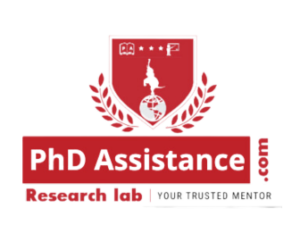
We offer complete assistance for PhD scholars that comprises topic selection, research services, pilot study to a full thesis writing. We help you at any part or any phase of your dissertation, partially or completely, and we strive for perfection in it. Our services are diverse and standardised, but not limited.
Main Services
PhD Dissertation PhD Topic Selection Editing Services Literature Review Data Analysis Coursework
Quick Links
Blog Insights Our Sample works Faq
UK : +44-7537 144372
India : +91-9176966446
Landline : +91-44-42124284 (Between 9.00 am – 6.00 pm IST)
For existing clients: +91-8754446693
Customer Care: +91-9384672299
Email: [email protected]
© 2024 PhD Assistance. All rights reserved.
- The Graduate School >
- Beyond the Classroom >
- Graduate Professional Development >
- Graduate Professional Development for Doctoral Students >
Research and Research Impacts Resources for Doctoral Students

Research in your discipline is an important skill you will develop throughout your program. The professional development skills in research that you gain in your degree program will be unique to your discipline. You will cultivate discipline-specific research skills through completing courses, degree requirements, research roles, and through more applied experiences like internships or field rotations.
Graduate students typically take research methods classes as part of their degree program at UB and have research requirements like producing a master's thesis, project or doctoral dissertation.
But, there are multiple skills to learn, disciplinary research and research skills beyond your discipline. How can you gain research skills or build upon your current skills?
Write a fellowship.
Write a grant..
Grant writing skills are critical to completing and disseminating your research and a mark of success in academic and professional careers. To gain these important skills, students can assist faculty with grant proposals, attend a grant writing workshop hosted by the Graduate School or submit a grant on their behalf.
Graduate Professional Development offers grant writing workshops for graduate students in STEM disciplines and Social Sciences/Humanities. Workshops are offered online and live twice yearly and recorded for additional access.
Mark Diamond Research Fund The Mark Diamond Research Fund (MDRF) offers grants to graduate students for research expenses related to their thesis or dissertation. PhD students may apply for up to $5,000 and master's and MFA students for up to $3,000. The MDRF grant is only for University at Buffalo graduate students in programs participating in the Graduate Student Association (GSA) and who have not waived the student activity fee. Applicants should be in the latter stages of research. MDRF accepts proposals in fall, spring and summer.
Serve on a Mark Diamond Research Fund (MDRF) review council.
Volunteer to serve on the MDRF review council. This volunteer opportunity will give you insights into what it takes to get your proposal funded and what it looks like to get a grant funded. This is a wonderful professional development experience to learn more about grants and proposal submissions. Calls for volunteers go out each grant cycle. For more information, contact the MDRF Director at [email protected] .
Complete training in responsible conduct of research.
All students admitted to a PhD program for the fall 2009 semester or thereafter are required to document successful completion of Responsible Conduct of Research (RCR) training when they submit their PhD Application to Candidacy form for their PhD degree. This training requirement may be fulfilled by either (1.) Enrolling in and passing with a grade of B (3.00) or better LAI 648 Research Ethics or RPG 504 Responsible Conduct of Research or BMS 514 Intro to Scientific Investigation and Responsible Conduct or RSC 602 Research Ethics for the Health Sciences or (2.) Completing a Collaborative Institutional Training Initiative (CITI) online Responsible Conduct of Research course with an average score of 80 percent or higher, or (3.) Successfully completing UB's Responsible Research micro-credential . Students opting to complete the CITI online course or the Responsible Research micro-credential must supply proof of completion with their PhD Application to Candidacy.
Serve as a Research Assistant (RA).
Faculty with research grants or contracts hire graduate students as research assistants (RA). The RA assignment and funding are tied to the faculty member's work. Discuss research assistantships with your faculty mentor or director of graduate studies.
Present your research.
Any time you present your research you improve your communication skills. Present in your research group, at department talks, and to groups outside of your discipline. Each type of research talk is valuable to your professional development.
Every year in April the University at Buffalo hosts a campus-wide student showcase of research as part of the Celebration of Academic Excellence . Departments nominate graduate students to present their research posters for the showcase. Attend the showcase to learn about the research happening across the university and apply to present your research.
Attend research talks in and out of your department.
Take advantage of all the public research talks in and out of your department. Even if the research is not something you're familiar with, you can learn about the wider research in your discipline and pick up communication tips. Asking questions of experts and getting to network with the speaker and attendees is also important for professional development.
Think about how your research fits into diverse career paths.
Your research does not necessarily lead you into one specific career path. Take time to explore how your research interests and skills can be applied to multiple career paths, both inside and outside of academia. Online Individual Development Plans (IDPs) and platforms, such as MyIDP for STEM disciplines and ImaginePhD for humanities and social sciences, give you a way to assess your skills and see how they match to opportunities. UB also subscribes to Beyond the Professoriate , which helps graduate students and postdoctoral fellows understand and articulate how their research skills match with career and job opportunities.
Through UB's Social Impact Fellows program , MBA and MSW students from the School of Management and School of Social Work, along with graduate students from the College of Arts and Sciences create social innovation in Western New York. Together, students collaborate, address pressing issues and make an impact.
Fellowships and scholarships are among the most valuable forms of aid you can receive during your college career and are designed to support students who have exceptional academic records and potential. Meet with the Office of Fellowships and Scholarships to discuss scholarship opportunities.
University Libraries offer an outstanding array of information resources, technologies, services and people to support the academic and creative achievements of our students.
Other Research Training Opportunities
- Biostatistics, Epidemiology, Research Design (BERD) Workshops
- SUNY Office of Research, Innovation and Economic Development
- Build Your Research Community is a free course consisting of five modules offered by the Science Communication Lab. This course guides science trainees through identifying mentors and building and maintaining strong mentoring relationships.
- The University Libraries offer research support. They have compiled Research Guides by discipline, Research Tips on locating materials, and Workshops to assist students, including Endnote, Microsoft Excel, database searching and more.
External Resources
- Google Scholar Profiles is a way to showcase your academic publications. If your profile is public, you will appear here when people search for your name.
- Research Gate is a free platform that connects science and research communities. Connect with experts in your field.
- Research Rabbit is an innovative citation-based literature mapping tool available online.
- Connected Papers is a tool to help researchers and applied scientists find and explore papers relevant to their field of work in a visual way.
Stay Informed
The graduate brief.
Every Wednesday during the semester, the Graduate School emails the Graduate Brief to all doctoral and professional students. The Grad Brief is a weekly selection of news and happenings within the Graduate School and its partnering offices. If you want to be added to the mailing list, please contact [email protected] .
Upcoming Events
An official website of the United States government
Official websites use .gov A .gov website belongs to an official government organization in the United States.
Secure .gov websites use HTTPS A lock ( Lock Locked padlock icon ) or https:// means you've safely connected to the .gov website. Share sensitive information only on official, secure websites.
- Publications
- Account settings
- Advanced Search
- Journal List

Humanizing science: seven actions for PhD students to become next generation, future-proof scientists
Ingrid valks, dara satrio, angelica reitsma, katja wolthers, kris dierickx, kim benschop, dasja pajkrt.
- Author information
- Article notes
- Copyright and License information
Email: [email protected]
Email: [email protected]
* authors contributed equally
Competing interests: Ingrid Valks, the co-author of this essay, is the owner and initiator of the power of time off and the curator of the OrganoVIR personal development program. The power of time off has been invited by OrgaonVIR to design a personal development programme for the ESRs to deliver to society the next generation of scientists who are confident and resilient human beings who are a role model for being compassionate future-ready leaders in science. The personal development program is named BeyondU and is also available for businesses and other consortia or organizations in science. Ingrid Valks has no connections with organizations who will gain or lose financially from the online listing of this work. Ingrid Valks is not applying for any patents. Neither received fees or else for patent relating content. Ingrid Valks have not co-authored a paper with any of the authors of the paper in question in the past three years.
Accepted 2023 Sep 21; Collection date 2022.
This is an open access article distributed under the terms of the Creative Commons Attribution Licence, which permits unrestricted use, distribution, and reproduction in any medium, provided the original work is properly cited.
Version Changes
Revised. amendments from version 1.
After revising the article based on the feedback given by the reviewers, we have made several changes to the article. Within the introduction we have provided several arguments on the importance of having a program that trains ‘human skills’ as such programs will help increase a PhD graduate’s employability. Following this addition, we have also created a section that explains the need for training in human skills and the reason for the use of ‘human skills’ within the essay. Moreover, we added Figure 1 “Three biggest personal changes ESRs want to make during their PhD journey” in the section ‘Going Beyond Science’ to present the three biggest personal changes the ESRs wanted to make during the PhD studies. Additionally, Figure 2 “Human and Vitality Wheel by Valks in the BeyondU personal development program for OrganoVIR” was also added under the section ‘Personal Development Plan’ to present the seven actions that were taken to guide OrganoVIR’s ESRs in becoming future-ready leaders in business and science. Finally, we have also considered the feedback given by the reviewers and have consulted various literature to support our claims and arguments within the article.
PhD students, also referred to as the early stage researchers (ESRs), that were participating in the European Union’s Horizon 2020 consortium, OrganoVIR, have the ambition to become top scientists in virology with innovative, animal-free, research models; organoids. To achieve this ambition, developing more self-confidence and resilience was used to strengthen personal leadership needed in such professional role. Towards this purpose, seven actions have been selected that guide the ESRs through their PhD journey and help them elevate their career perspectives and employability in the international labor market. In this essay, we share the seven personal development actions that have been carried out by the ESRs in the OrganoVIR H2020 Innovative Training Network (ITN) project, with the goal of demonstrating how training human skills can contribute to innovation and collaboration in European research. This article is an effort by OrganoVIR’s Training and Education Committee to provide views on personal growth and leadership awareness.
Keywords: Personal Development, Early Stage Researchers, Next Generation Scientists, Innovative Training Network
Plain language summary
This article highlights the importance of including a personal development program in a research training program, particularly, one that employs PhD students. A survey conducted by Nature (2019) shows that PhD students work for over 40 hours every week and that they ranked their work–life balance as a main concern throughout their PhD project. Additionally, academic pressure, uncertainty, and the amount of workload also play a role in mental health problems amongst PhD students. PhD students struggling with mental health problems are reluctant to seek treatment. This is caused by the fear of stigma or the fear of potential negative impact it might have on their future careers.
Supervised skill-building programs have shown to improve the lives of university students and to boost their professional influence ( Conley et al. , 2015 ). These programs have helped minimize mental health problems such as anxiety and depression and can improve social and emotional skills. Within the OrganoVIR Personal Development Plan, OrganoVIR’s PhD students, also known as early stage researchers (ESRs), were guided through seven actions to help them become the next generation of scientists. These actions include taking care of their personal well-being, achieving a better understanding of their purpose in life, discovering their own identity, having an excellent understanding of how values and beliefs impact internal and external communication, boost emotional competences, integrating insights in personal and professional life as well as experimenting with new leadership behavior, and recognizing and leading ethical dilemmas.
Introduction
OrganoVIR is an EU Horizon 2020 Innovative Training Network (ITN) under the EU Horizon 2020 research program, coordinated by Dr. Katja Wolthers and Prof. Dasja Pajkrt. OrganoVIR’s training program trains PhD students or Early Stage Researchers (ESRs) in the field of human organoids for virus research.
Over the years, human organoids have increasingly become an essential tool for virus research due to their ability to accurately mimic how human organs react to human viruses as well as antivirals. Understanding these interactions is a critical step to prevent viruses from spreading and ultimately, to develop treatments. Realizing its potential to transform the virology landscape, the OrganoVIR consortium trained ESRs to lead innovation in the field of organoids for virus research.
In the past, a high education qualification may have been sufficient for a PhD graduate’s employability ( de Weert, 2007 ), however, with changes such as increased globalization and increased job insecurity ( Forrier & Sels, 2003 ; Fugate et al. , 2004 ; Sung et al. , 2008 ), PhD graduates can no longer rely solely on their education qualification. Furthermore, in an age of advanced technology and automation, the ‘human’ jobs that will remain will require individuals with critical thinking and collaboration skills – skills that machines currently do not fully have ( Stirrett, 2017 ). PhD students will need to adapt to change and work towards achieving a competitive advantage over other graduates with similar academic backgrounds ( Tomlinson, 2012 ).
The next generation of scientists
When the OrganoVIR project was created, Wolthers and Pajkrt recognized that it is important for the next generation of scientists to participate in a training program that covers the whole value chain, from laboratory to market. Developing and acquiring a combination of hard skills and soft skills will help PhD students to achieve a competitive advantage in the labour market ( Clarke, 2017 ; Crossman & Clarke, 2010 ). With training that focuses on developing their soft skills, the next generation of scientists will become confident and resilient individuals who lead with compassion and are able to operate within commercial settings.
Thus, at the start of the OrganoVIR project, three skill-sets were defined: 1) technical skills and academic skills to become an academic researcher in virus research with organoids through the scientific training program; 2) managerial skills through the newly developed and tailored pre-MBA; and, most importantly, 3) human skills through the BeyondU Personal Development Plan. Human skills, also called life skills or soft skills, are personal-oriented skills that require a mind–body–heart connection. These are skills that enable a person to think clearly, to collaborate harmoniously in teams, and to lead people with compassion ( Vasanthakumari, 2019 ).
In this essay, we will use the term “human skills” instead of “soft skills” as we believe that it provides a broad umbrella definition to describe a wide subset of characteristics to regulate emotions, act and react mindfully and be self-aware. These human skills, which can be developed outside formal learning and throughout life, are uniquely ‘human’ and are able to bridge the gap caused by robots and algorithms ( European Skills Agenda for Sustainable Competitiveness, Social Fairness and Resilience, European Commission, p.13, 2020 ). In this essay, we will be focusing on the third and final skill set; human skills developed through the Personal Development Plan (PDP).
Going Beyond Science
During the intake, we used Google Forms to ask OrganoVIR’s 14 ESRs, who represent 13 nationalities, about their motivation to join OrganoVIR and what they would like to focus on in the next three years during their Personal Development Plan in two open questions.
As a result, we observed that there were three key factors that motivated these ESRs to join OrganoVIR: intellectual development and the opportunity to collaborate with an international team in academics and business, the opportunity to be mentored by experts from across Europe, and the training program that pays attention to self-development. Results showed that the ESRs would like to develop their self-confidence, understand themselves better, and maintain their well-being ( Figure 1 ).
Figure 1. Three biggest personal changes ESRs want to make during their PhD journey.
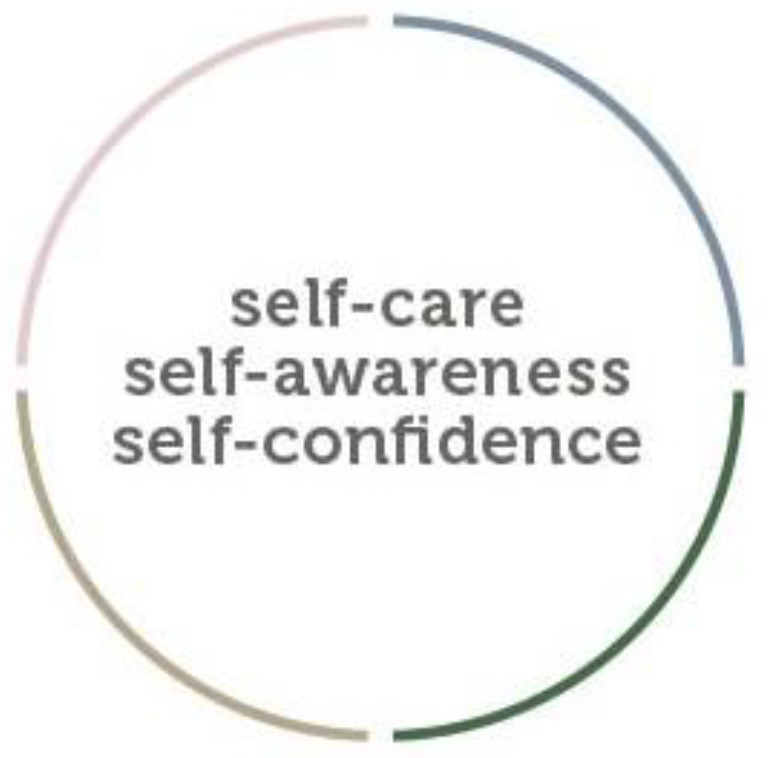
Through collaboration with The Power of Time Off , a consultancy firm for sustainable employability and conscious leadership, OrganoVIR implemented the BeyondU Personal Development Plan (BeyondU PDP). The PDP is focused on helping the ESRs achieve better performance, increase their professional influence by developing personal competences, and provide them with greater peace of mind. Under the guidance of Valks, an experienced Personal Development coach and founder of The Power of Time Off , OrganoVIR trained ESRs to become confident and resilient leaders in the field of virology as a result, providing them with a competitive advantage in the international labor market.
The PDP is a blended program that integrates different approaches to providing support for the ESRs’ personal development which includes live, online through the e-learning platform and workshops, and off-grid educational experiences in nature. Throughout their PhD studies, OrganoVIR’s ESRs were also provided access to support groups, peer groups (for instance, a philosophical café initiated by one of the ESRs), and individual sessions with their personal development coach. During these individual sessions, the ESRs were able to address their personal challenges. These sessions have played an important role in supporting the ESRs throughout their project.
The Personal Development Plan (PDP)
The BeyondU PDP is a program that is fully committed to developing human skills, personal competences, and practicing well-being as foundation skills for future-ready leaders in business and science. The program is based on the logical levels of Bateson (1972) and Dilts (1996) , an analysis and change model that provides insight into the different levels of communication, change, and functioning and describes a systematic approach to change. Based on the hierarchy in the processes of learning, change, and communication formulated by Bateson (1972) , Dilts (1996) defined six logical levels; purpose, identity, values and beliefs, emotional capabilities, behavior, and environment. The PhD students of OrganoVIR follow the modules in the PDP in the specific order recommended by Bateson and Dilts’ model.
Within the PDP, a seventh action is added: practicing well-being as a foundation skill to take leadership of our own mental well-being and vitality. Due to the typical 21st-century challenges such as a desire for finding meaning in life, rapid changes, overload of work and information, time pressure and the uncertainty of our role as humans with the rise of technology, we also need to take leadership of our own (mental) well-being and vitality ( Hougaard & Carter, 2018 ; Harari, 2019 ). The well-being modules align with the theory of both Scharmer (2009) and Judith (1987) , who identify that humans need to connect on different intelligence levels such as physical, emotional, mental, and spiritual.
Together with the coach of the Power of Time Off , we explored the seven actions in the BeyondU personal development plan which includes the following: 1) taking care of your personal well-being; 2) achieving a better understanding of your purpose in life; 3) discovering your own identity; 4) having an excellent understanding of how values and beliefs impact communication; 5) boost emotional competences; 6) integrating insights in personal and professional life as well as experimenting with new leadership behavior; and 7) recognizing and leading ethical dilemmas. These actions are described in more detail below ( Figure 2 ).
Figure 2. Humanity and Vitality Wheel by Valks in the BeyondU personal development program for OrganoVIR.
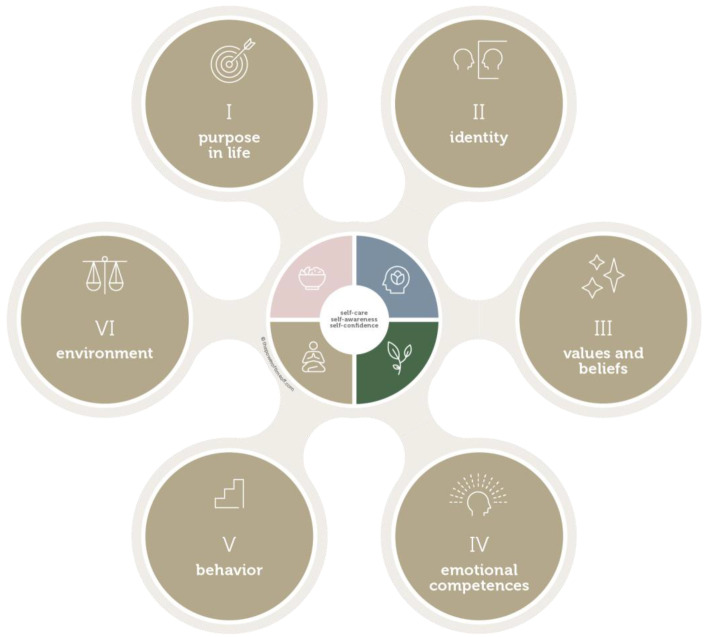
Action 1: Practice well-being as a foundation skill
It has been argued that personal well-being – defined by the Centers for Disease Control and Prevention (2018) as the presence of positive emotions, satisfaction with life, and positive functioning – is able to affect an individual’s ability to recover their mental health after facing challenges ( Stoffel & Cain, 2018 ). Practicing well-being as a foundation skill is key to improving personal resilience. The next generation of scientists must be physically, emotionally, and mentally fit to overcome challenges, stress, anxiety, and sometimes, loneliness in their way.
A survey conducted by Nature ( Lauchlan, 2019 ) reported that 76% of PhD students worked more than 40 hours per week and that 79% PhD students ranked their work–life balance as a main concern throughout their studies. Aside from their work–life balance, there are other factors that affect the mental health of PhD students. These include the pressure to publish, a strain on relationships with their advisors, uncertainty and financial insecurity, the competitive academic job market, and workload ( Levecque et al. , 2017 ; Mackie & Bates, 2019 ; Wyatt & Oswalt, 2013 ). The Nature survey also revealed that out of 6,320 PhD students, only 36% of these students sought treatment for mental problems such as anxiety and depression. According to the Organisation for Economic Co-operation and Development (2015) , the reluctance to seek help for mental problems amongst PhD students is caused by the fear of stigma or the negative impact on their future careers.
A study by Conley et al. (2015) showed that skill-building interventions such as personal development programs can improve the lives of university students, reduce anxiety, stress, depression, and in improving social and emotional skills. Within the PDP, well-being modules were offered in the form of live masterclasses and virtual masterclasses (monthly e-vitality courses). The holistic approach of the well-being modules includes nature connection, meditation and breathing, nutrition, healthy lifestyle, stress relief, and learning to relax.
Following the completion of the OrganoVIR project and the PDP, ESRs were asked the fill in an evaluation survey. For one of the ESRs, the e-vitality courses reminded her of the importance of balancing her dream career in research and maintaining a healthy mindset. Additionally, to another ESR, the first action helped him not only to understand the importance of taking care of himself but also to address sources of issues from the workplace.
Action 2: Discover your purpose in life
As human beings, each of us has the drive to find meaning and significance in our lives that enables us to endure challenges ( Frankl, 1963 ). Having a purpose motivates a person to dedicate their resources towards particular goals and to be more resilient to challenges and change ( Kashdan & McKnight, 2009 ). Under the guidance of experienced personal development coaches in a live masterclass, OrganoVIR’s ESRs identified and explored their purpose and passion in life.
According to Dhingra et al. (2021) , when personal and organizational purposes are aligned, it will result in healthier, more resilient employees, stronger employee engagement, increased loyalty, and a higher willingness to recommend the company to others. Having a sense of purpose helps individuals to feel an increase in work gratification ( Bonebright et al. , 2000 ), life fulfillment, well-being and happiness ( Debats et al. , 1993 ; Zika & Chamberlain, 1992 ). This became apparent in times of uncertainties during the COVID-19 outbreak when many of the ESRs had limited access to their laboratories.
It is widely known that the COVID-19 pandemic has disrupted the scientific industry. As remote working grew popular for other occupations, studies showed a sharp decline in the amount of time scientists spent on research. For instance, in April 2020, a study found that scientists experienced a decrease of 7 hours in their laboratory compared to pre-pandemic ( Gao et al., 2021 ). Additionally, it has been argued that the pandemic had impacted female scientists, ‘bench’ scientists (scientists who require workbenches for work in the laboratory), and scientists with young children the most compared to other groups of scientists ( Myers et al. , 2020 ).
Realizing their purpose can guide an individual through tough decisions and tough times and inspire them to move forward ( Brassey et al. , 2021 ). By understanding their purpose, the ESRs were able to identify situations that were not beneficial to them or that do not contribute to their purpose, and to avoid these situations or delegate tasks where possible.
Action 3: share your identity with the outside world
The term identity refers to an individual’s traits, attitude, cognitive behaviors, and experiences ( Guenther et al. , 2020 ). There are two types of known identities; personal (otherwise known as individual) and social ( Vignoles, 2018 ). During the PDP, personal development coaches guide OrganoVIR’s ESRs to discover their identity through the masterclass ‘the power of your voice’, weekly online interactions, interactive assignments to help discover their identity, role model interviews, and finally, individual coaching calls.
By speaking more concisely and clearly, the ESRs were able to influence their audience more effectively; to convince them, to gain their attention during a presentation and to be recognized as an opinion leader. Personal coaching by an experienced personal development coach helps ESRs to turn weaknesses into strengths, showing them factors that hinder their growth and development. With this new skill, ESRs were able to connect with themselves and have more impactful communication.
Within the third action, OrganoVIR’s ESRs were taught the following lessons;
To become more aware of their proudest achievements, the things they like about themselves, and the things that give them joy. To listen to their inner voice and allow their senses to connect and build deeper human relationships, even through their computer screen during the pandemic.
To identify the most suitable tone of voice for themselves.
To become more self-confident and to step out of their comfort zone.
The aforementioned lessons were summarized based on answers provided by OrganoVIR’s ESRs. Answers were provided anonymously through an evaluation survey.
Action 4: understand the impact of cross-cultural values and beliefs
Within an international environment, it is important to understand that different people have different values on a macro and micro level. Every country has their own special cultural thinking and values, otherwise known as a set of beliefs that serves as a guideline in an individual’s life that affects the way an individual evaluates others and certain events in their lives ( Kesberg & Keller, 2018 ; Zhao et al. , 2020 ). Hofstede’s work, in which he conceptualized how 40 countries and cultures differ ( Hofstede, 1983 ), is perhaps the best example to observe the differences of values among different cultures.
Often, miscommunications can occur during a cross-cultural interaction due to cultural gaps that neither parties are aware of ( Carté & Fox, 2008 ). The fourth action within the PDP minimized communication gaps caused by cultural differences through increasing the ESR’s awareness of cultural values and the impact of behavior and intercultural communication in an international work environment. During the masterclass ‘Social patterns, cultural beliefs and the impact on our communication’, which was carried out virtually due to the pandemic, ESRs were invited to take a closer look at values and beliefs in two levels; macro and micro.
Within the macro level, experienced PDP coaches guided the ESR to decode their own culture and their peer’s cultures. During the online masterclass, the ESRs were encouraged to answer the question ‘how does your, and others, culture communicate, persuade, trust, evaluate, disagree, decide, lead, and plan?’. Often, we are not fully aware of our cultural patterns and therefore we are not always aware of the impact of our behaviour on our foreign co-workers. The culture map of Erin Meyer (2014) was used throughout the masterclass as it focuses on how the world’s most successful leaders navigate the complexities of cultural differences in a multicultural environment.
Moreover, on a micro level, the ESRs delved into their first interaction system, namely their family. During this masterclass, the ESRs analyzed their background and how it formed their identity and to recognize patterns and behaviors that were helpful to their personal growth.
Upon completion of the fourth action, OrganoVIR’s ESRs anonymously reported the following lessons; 1) the ability to comprehend the differences between how high and low context culture communicates, 2) to be aware of the impact of their own communication style, and 3) motivation to become more assertive and confident in expressing their opinions.
Action 5: boost your emotional competences
Emotional intelligence, also known as emotional competence, is the ability to understand personal and impersonal emotions, to discriminate between different emotions, and to use emotional information as a guide to think and behave ( Srivastava, 2013 ). Having high emotional intelligence can help individuals increase their productivity, ability to manage stress, and communication in specific scenarios ( Serrat, 2017 ; Sinha & Sinha, 2007 ). Individuals who have ambitions to have a professional influence and a healthy, happy work life will benefit from having emotional competences.
Emotional competences are one of the defining characteristics of success in the workplace. To boost emotional competences, one must first begin with consciousness. Being aware of the present with a calm, focused, and clear mind will have a positive impact on the ESR’s physiology, psychology, and work performance. Second, one must have compassion for themselves and for others. Having compassion means the act or capacity for having sympathy for the suffering of yourself or others together with the wish to alleviate it. Third, one must have the ability to create meaningful connections including with their own selves. Creating meaningful connections will help to be good listeners and be more attentive, which will ultimately improve our self-esteem, happiness, and well-being.
Much like the previous actions, the masterclass for the fifth action could not take place live due to the pandemic and therefore was carried out online. As a result, Valks provided the ESRs with weekly online learning content about Emotional Intelligence. Additionally, the ESRs were given the opportunity to participate in online retreats provided by the power of time off. The holistic approach of the virtual retreat calendar includes three courses to develop emotional intelligence, manage vitality and improve work-life balance: 1) mind training, 2) nature connection, and 3) stress relief and (learn to) relax.
Action 6: work and lead from your future-self
To become a 21 st century leader in science, ESRs will need to embrace the challenges they face in today’s world. New, more human-focused, leadership starts with embodying well-being, developing personal competences, and leading from the future. During this module in the personal development plan, the ESRs reflect on their insights and learnings throughout their PDP journey. Sharing answers to questions such as “What have I already integrated in life and at work” and “What did I let go, what behavior am I experimenting with?”.
Furthermore, the ESR’s behavior is the vehicle that takes them to what they would like to achieve in life. Since they were the initiator of their behavior, the ESRs were guided, during this PDP module, through a process in which they see themselves with a new perspective.
Action 7: recognize moral dilemmas and demonstrate moral courage
Through the final action in the PDP, OrganoVIR’s ESRs were encouraged to focus on their personal and professional environment. Within these environments, dilemmas will arise, and decisions must be made. To make a suitable decision, a good moral compass and moral courage is required. Therefore, ESRs were trained to identify and to lead conversations about ethical dilemmas in a seven-step-approach ( Loyens et al. , 2008 ). To demonstrate moral courage, ESRs learn to bridge the gap between thinking and doing.
The seventh action of the PDP is conducted in two sessions of masterclasses. In the first session, a step-by-step plan for moral inter-vision is provided to move from thinking and talking towards doing in difficult situations. The step-by-step plan or the moral inter-vision model is a tool that organizes and provides insight into the decision-making process in difficult situations and thus ensures that the conversation goes beyond exchanging experiences and giving spontaneous comments.
The model consists of 7 steps or 7 questions and forces some tempo delay, creating space to question the obvious. The model certainly also has room for emotions. An emotion is an 'advocate', an emotion indicates that something is at stake that we consider important and a response is needed.
The final session completes the circle of the BeyondU leadership program. Our purpose, identity, values, beliefs and emotional competences influence how we experience difficult situations. With the help of this masterclass, OrganoVIR’s ESRs discovered and learned how to deal with ethical dilemmas and to arrive at a moral solution.
Upon evaluation, 4 out of 14 ESRs claimed that the seventh action helped them recognize the importance of addressing sources of issues in the workplace and to demonstrate the courage to implement learnings from this action.
Understanding people and creating connections, including with ourselves, is one of the most important aspects for PhD students to become a human and a future-proof scientist. PhD students who are well developed in their personal competences and who practice well-being as a foundation skill can take leadership of their personal and professional life. With its goal to develop the next generation of scientists to become the innovative leaders of tomorrow, OrganoVIR understands the need for a personal development program and has therefore incorporated the BeyondU Personal Development Plan into its training program. In a world of constant change, we must navigate our scientists to be ready for 21 st century challenges by providing a program that advances their human skills. Only then, when scientists have developed their human skills, will we be able to humanize science.
Ethics and consent
Ethical approval and consent were not required.
Acknowledgements
We would like to thank all ESRs of the ITN project OrganoVIR for their trust and engagement in the BeyondU program and for sharing their insights and lessons learned: Emilia Barreto Durán, Asli Aybike Doğan, Igor Lopes Coqueiro, Georgios Stroulios, Louisa Wallace, Laurensius Kevin Lie, Inés García Rodríguez, Giulia Moreni, Thuc Nguyen Dan Do, Fatma Masmoudi, Andrew Barnhart, Ciro Esposito, Nânci Ferreira and Louise Bondeelle.
Funding Statement
This project has received funding from the European Union’s Horizon 2020 research and innovation programme under the Marie Skłodowska-Curie grant agreement No 812673.
The funders had no role in study design, data collection and analysis, decision to publish, or preparation of the manuscript.
[version 2; peer review: 2 approved, 2 approved with reservations]
Data availability
No data are associated with this article.
- Bateson G: Steps to an ecology of mind.Ballantine, New York,1972. Reference Source [ Google Scholar ]
- Bonebright CA, Clay DL, Ankenmann RD: The relationship of workaholism with work–life conflict, life satisfaction, and purpose in life. J Couns Psychol. 2000;47(4):469–477. 10.1037/0022-0167.47.4.469 [ DOI ] [ Google Scholar ]
- Brassey J, De Smet A, Kothari A, et al. : Future proof: Solving the “adaptability paradox” for the long term.McKinsey & Company,2021. Reference Source [ Google Scholar ]
- Carté P, Fox C: Bridging the culture gap: A practical guide to international business communication.Kogan Page,2008. Reference Source [ Google Scholar ]
- Centers for Disease Control and Prevention: Well-Being Concepts.Centers for Disease Control and Prevention. October 31,2018. Reference Source
- Clarke M: Rethinking graduate employability: the role of capital, individual attributes and context. Studies in Higher Education. 2017;43(11):1923–1937. 10.1080/03075079.2017.1294152 [ DOI ] [ Google Scholar ]
- Conley CS, Durlak JA, Kirsch AC: A Meta-analysis of Universal Mental Health Prevention Programs for Higher Education Students. Prev Sci. 2015;16(4):487–507. 10.1007/s11121-015-0543-1 [ DOI ] [ PubMed ] [ Google Scholar ]
- Crossman JE, Clarke M: International experience and graduate employability: stakeholder perceptions on the connection. Higher Education. 2010;59(5):599–613. 10.1007/s10734-009-9268-z [ DOI ] [ Google Scholar ]
- Debats DL, Van der Lubbe PM, Wezeman FR: On the psychometric properties of the Life Regard Index (LRI): A measure of meaningful life: An evaluation in three independent samples based on the Dutch version. Personality and Individual Differences. 1993;14(2):337–345. 10.1016/0191-8869(93)90132-M [ DOI ] [ Google Scholar ]
- de Weert E: Graduate Employment in Europe: The Employers’ Perspective.In: Careers of University Graduates. Views and Experiences in Comparative Perspectives. edited by U. Teichler, Dordrecht: Springer,2007; 17:225–246. 10.1007/978-1-4020-5926-1_14 [ DOI ] [ Google Scholar ]
- Dhingra N, Samo A, Schaninger B, et al. : Help your employees find purpose-or watch them leave.McKinsey & Company, April 5, 2021. Reference Source [ Google Scholar ]
- Dilts R: Visionary Leadership Skills.Capitola, CA: Meta Publications,1996. Reference Source [ Google Scholar ]
- European skills agenda for sustainable competitiveness, Social Fairness and Resilience. European Website on Integration.2020. Reference Source [ Google Scholar ]
- Forrier A, Sels L: The Concept Employability: a Complex Mosaic. International Journal of Human Resources Development and Management. 2003;3(2):102–124. 10.1504/IJHRDM.2003.002414 [ DOI ] [ Google Scholar ]
- Frankl VE: Man’s search for meaning: An introduction to logotherapy.New York:Washington Square Press,1963. Reference Source [ Google Scholar ]
- Fugate M, Kinicki AJ, Ashforth BE: Employability: A Psycho-Social Construct, its Dimensions, and Applications. J Vocat Behav. 2004;65(1):14–38. 10.1016/j.jvb.2003.10.005 [ DOI ] [ Google Scholar ]
- Gao J, Yin Y, Myers KR, et al. : Potentially long-lasting effects of the pandemic on scientists. Nat Commun. 2021;12(1): 6188. 10.1038/s41467-021-26428-z [ DOI ] [ PMC free article ] [ PubMed ] [ Google Scholar ]
- Guenther CL, Wilton E, Fernandes R: Identity.In: Zeigler-Hill, V., Shackelford, T.K. (eds) Encyclopedia of Personality and Individual Differences. Springer, Cham.2020;2136–2145. 10.1007/978-3-319-24612-3_1132 [ DOI ] [ Google Scholar ]
- Harari YN: 21 Lessons for the 21st Century.Harvard Business School Publishing - Harvard Business Review Press,2019;29–30. [ Google Scholar ]
- Hofstede G: National Cultures Revisited. Behavior Science Research. 1983;18(4):285–305. 10.1177/106939718301800403 [ DOI ] [ Google Scholar ]
- Hougaard R, Carter J: The Mind of the Leader: How to Lead Yourself, Your People, and Your Organization for Extraordinary Results.Harvard Business Review Press,2018. Reference Source [ Google Scholar ]
- Judith A: Wheels of life.Llewellyn Publications,1987. Reference Source [ Google Scholar ]
- Kashdan TB, McKnight PE: Origins of purpose in life: Refining our understanding of a life well lived. Psihologijske Teme. 2009;18(2):303–316. Reference Source [ Google Scholar ]
- Kesberg R, Keller J: The Relation Between Human Values and Perceived Situation Characteristics in Everyday Life. Front Psychol. 2018;9: 1676. 10.3389/fpsyg.2018.01676 [ DOI ] [ PMC free article ] [ PubMed ] [ Google Scholar ]
- Lauchlan E: Shift Learning Nature PhD Survey 2019. Nature. 2019;2. Reference Source [ Google Scholar ]
- Levecque K, Anseel F, De Beuckelaer A, et al. : Work organization and mental health problems in PhD students. Research Policy. 2017;46(4):868–879. 10.1016/j.respol.2017.02.008 [ DOI ] [ Google Scholar ]
- Loyens K, Maesschalck J, Wijnen T: Het bevorderen en ontwikkelen van een ethisch klimaat in de organisatie. De rol van dilemmatrainingen in een integriteitsbeleid.In: Praktijkboek kwaliteitszorg in welzijnsvoorzieningen. Politeia; Brussel.2008;837–854. Reference Source [ Google Scholar ]
- Mackie SA, Bates GW: Contribution of the doctoral education environment to PhD candidates’ mental health problems: A scoping review. Higher Education Research & Development. 2019;38(3):565–578. 10.1080/07294360.2018.1556620 [ DOI ] [ Google Scholar ]
- Meyer E: The culture map: breaking through the invisible boundaries of global business. First edition. New York, PublicAffairs.2014. Reference Source [ Google Scholar ]
- Myers KR, Tham WY, Yin Y, et al. : Unequal effects of the COVID-19 pandemic on scientists. Nat Hum Behav. 2020;4(9):880–883. 10.1038/s41562-020-0921-y [ DOI ] [ PubMed ] [ Google Scholar ]
- OECD: Fit Mind, Fit Job: From Evidence to Practice in Mental Health at Work.Mental Health at Work. OECD Publishing,2015. 10.1787/9789264228283-3-en [ DOI ] [ Google Scholar ]
- Scharmer CO: Theory U: Leading from the Future as It Emerges.Berrett-Koehler Publishers,2009;1(2). 10.1177/194675670900100213 [ DOI ] [ Google Scholar ]
- Serrat O: Understanding and Developing Emotional Intelligence.In: Knowledge Solutions. Springer, Singapore,2017;329–339. 10.1007/978-981-10-0983-9_37 [ DOI ] [ Google Scholar ]
- Sinha S, Sinha D: EMOTIONAL INTELLIGENCE AND EFFECTIVE COMMUNICATION.2007. Reference Source
- Srivastava K: Emotional intelligence and organizational effectiveness. Ind Psychiatry J. 2013;22(2):97–99. 10.4103/0972-6748.132912 [ DOI ] [ PMC free article ] [ PubMed ] [ Google Scholar ]
- Stirrett S: It’s human skills – not technical skills – that we need the most in today’s work force.The Globe and Mail, August 8,2017. Reference Source
- Stoffel JM, Cain J: Review of grit and resilience literature within health professions education. Am J Pharm Educ. 2018;82(2): 6150. 10.5688/ajpe6150 [ DOI ] [ PMC free article ] [ PubMed ] [ Google Scholar ]
- Sung J, Chi Man M, Loke F, et al. : The Nature of Employability Skills: Empirical Evidence from Singapore. Int J Train Dev. 2008;17(3):176–193. 10.1111/ijtd.12008 [ DOI ] [ Google Scholar ]
- Tomlinson M: Graduate Employability: A Review of Conceptual and Empirical Themes. High Educ Policy. 2012;25(4):407–431. 10.1057/hep.2011.26 [ DOI ] [ Google Scholar ]
- Vasanthakumari S: Soft skills and its application in work place. World Journal of Advanced Research and Reviews. 2019;3(2):66–72. 10.30574/wjarr.2019.3.2.0057 [ DOI ] [ Google Scholar ]
- Vignoles V: Identity: personal AND social.University of Sussex. Chapter.2018. Reference Source [ Google Scholar ]
- Wyatt T, Oswalt SB: Comparing mental health issues among undergraduate and graduate students. Am J Health Educ. 2013;44(2):96–107. 10.1080/19325037.2013.764248 [ DOI ] [ Google Scholar ]
- Zhao G, Han Y, Zhang Y: The Influence of Cultural Values on International Business Management and Related Activities. Modern Management Forum. 2020;4(2):47. 10.18686/mmf.v4i2.2115 [ DOI ] [ Google Scholar ]
- Zika S, Chamberlain K: On the relation between meaning in life and psychological well-being. Br J Psychol. 1992;83(Pt 1):133–145. 10.1111/j.2044-8295.1992.tb02429.x [ DOI ] [ PubMed ] [ Google Scholar ]
Reviewer response for version 2
Competing interests: No competing interests were disclosed.
This is an open access peer review report distributed under the terms of the Creative Commons Attribution Licence, which permits unrestricted use, distribution, and reproduction in any medium, provided the original work is properly cited.
I would like to approve this version and thank the authors for their attention and willingness to incorporate feedback.
Is the argument persuasive and supported by appropriate evidence?
Is the work clearly and cogently presented?
Is the topic of the essay discussed accurately in the context of the current literature?
Does the essay contribute to the cultural, historical, social understanding of the field?
Reviewer Expertise:
Doctoral education; transferable skills; inclusion.
I confirm that I have read this submission and believe that I have an appropriate level of expertise to confirm that it is of an acceptable scientific standard.
Sara Cotterall
I have read the revised article and am impressed at the extent to which the authors have improved the original draft.
Although I couldn't read Figure 2 because it was too small, I appreciated that they justified their focus on the ESR's personal skills by including reference to aspects of their research context and research lives. This, for me, was essential to contextualise the study. I also appreciate that they included one or two examples of participants' reflections on the programme and how it had helped them.
The only suggestion I would make is that they acknowledge how out of date Hofstede's work on cultural difference in the workplace is, and how discredited it has become. They could do this, for example, by saying something like - "although it has been criticised by some, Hofstede's original finding that...holds true" - or something like that.
Doctoral education, Higher education, Language teacher education, Language learner autonomy, Language learning strategies
Reviewer response for version 1
Rachel spronken-smith.
This article could do more to clearly establish why, within the field of doctoral science study, it is beneficial to include a personal development program. The program sounds very interesting, but as noted by previous reviewers, more literature is available to robustly ground the assertions made in the article. Please cite Lauchlan (2019) as the author of the Nature survey report.
I agree that the term ‘human skills’ feels somewhat disconnected to the aims suggested. While the company that delivers the program uses the term ‘human skills’, within the field of doctoral research, ‘transferable skills’ is more commonly used. In this case, the particular subset of transferable skills being discussed are personal competencies and wellbeing skills. The research of Senekal, Munnik and Frantz (2022) 1 provides some guidance on personal resourcefulness as part of expected doctoral attributes, and is worth considering.
It is not clear in the article whether authors are justifying their decision to include a personal development programme (which I applaud on a personal level), or whether they are arguing that such a program should be part of doctoral education for scientists in the 21 st century, for which they do not present sufficient evidence. The reporting of the program switches verb tense between Action 2 and Action 3, suggesting that perhaps the program was underway but not complete at the time of writing? Related to this, it is unclear how actions 2, 4 and 5 are actually developed – what are the activities? Some clarity on the argument would help readers decide on whether sufficient evidence has been provided for the claims made in the conclusion.
The article certainly has potential to contribute to the cultural and social understanding of the field of personal development and wellbeing during doctoral study within the particular historical context that we find ourselves, pre- and post-pandemic. Inclusion of a greater range of data (participants’ quotes as suggested) would enhance the contribution this essay can make. If the authors have the capacity to do so, a longitudinal study of the cohort would be particularly helpful to the field of doctoral academic development.
We confirm that we have read this submission and believe that we have an appropriate level of expertise to confirm that it is of an acceptable scientific standard, however we have significant reservations, as outlined above.
- 1. : A systematic review of doctoral graduate attributes: Domains and definitions. Frontiers in Education .2022;7: 10.3389/feduc.2022.1009106 10.3389/feduc.2022.1009106 [ DOI ] [ Google Scholar ]
Basil Cahusac de Caux
This essay is a welcome attempt at raising awareness of the needs of doctoral candidates beyond the hard skills they develop through (multi)disciplinary research and supervision. However, it would benefit from a number of amendments:
1. The work should be more concretely grounded in the literature on doctoral candidates. There are numerous papers, monographs, and edited books that deal specifically with the kinds of skills that doctoral candidates should develop, ways to develop such skills, and the necessity of fostering these skills in the first instance.
2. Reconsider your use of the term 'human skills', as it is too broad and has no real precedent in the literature. I recommend substituting it with the term 'transferable skills', as it represents practically the same set of skills you describe in your essay.
3. Given the small sample size (14 ESRs), it would be nice if you dedicated some space to the voices of your cohort. This would not only provide the reader with qualitative insights, but would also be good use of data that you have probably already generated. Doing this would lend more weight to the claims you make regarding 'self-reported [...] improvement in their mental wellbeing, happiness, concentration', etc.
4. While you hint at the impact of the pandemic, due to the wholesale closure of labs and research facilities, it would be remiss of you not to mention the impact of the pandemic on 'the new generation of scientists'. There is plenty of literature on this. You can consult journals such as The International Journal of Doctoral Studies and edited books published by Springer (e.g. Research and Teaching in a Pandemic World).
In addition to the above, there are a number of minor points that can be addressed. For instance, mention the year of publication immediately after the Bateson and Dilts citations (page 3). Add a visual representation of the Bateson (1972) and Dilts (1996) models to page 4. I also recommend adding a reference/ citation upon first mention of Action learning. Action 5 reads like a textbook description of mindfulness...is it? If so, cite one or two sources in the literature on mindfulness and doctoral candidates. Please also expand on Action 7, as it is too short in its current form. Please also use terminology consistently throughout your essay. For instance, you refer to your cohort as ESRs (early stage researchers) in most sections of the essay, but in the Conclusion you switch to PhD students. I would unify these two terms (as ESRs or PhD students -- the choice is yours).
Lastly, there are some grammatical and stylistic issues that can be easily addressed by proofreading the essay.
Sociology of Higher Education, Sociology of Language, Doctoral Studies
I confirm that I have read this submission and believe that I have an appropriate level of expertise to confirm that it is of an acceptable scientific standard, however I have significant reservations, as outlined above.
Liezel Frick
The article presented here is timely and relevant to the researcher careers and development community at large. The comments provided are aimed at helping the authors develop this work towards a more defendable contribution.
There is a growing body of literature that could support the argument which seems to have not been consulted - see for example the work of LERU working reports and the Wellcome Trust within grey literature, and the work of Kirsi Pyhalto and colleagues on researcher careers in STEM areas, as well as that of Karri Holley.
The notion of 'action learning' is currently under-theorised, while there is a wealth of literature emanating from both the managements sciences and education on the topic.
In order to make sense of the findings, readers would benefit from more detail on how the data was construed and interpreted in order to get to the seven actions presented here. This would make the study more defendable and rigorous.
How does the BeyondU PDP programme compare/differ to other similar programmes? What are the shortcomings of the programme? What are possible implications for policy, practice and future research?
Doctoral education
This essay addresses a critical issue that affects large numbers of PhD candidates and Early Stage Researchers (ESRs) worldwide: a marked increase in the levels of anxiety, stress and other mental health issues they experience. Given the high stakes nature of doctoral research, however, this issue is not always adequately acknowledged or addressed by research institutions. Consequently, research into ways of supporting the personal development of doctoral researchers together with their existing research skills training is essential.
However, personal development training of the type reported in this essay is not the only means of providing support. Other approaches include encouraging ESRs to establish and participate in (online) support groups (Panayidou & Priest, 2021 1 ; Elliot & Makara, 2021 2 ; Pretorious et. al ., 2019 3 ), enhancing the supervisory relationship (Wollast et al., 2023 4 ), and using writing networks to build confidence, boost motivation and support identity building (Aitchison & Guerin, 2014 5 ). It would have been good to locate the approach adopted in this study in the context of other well-researched approaches.
The account provided of the intervention delivered in this study raises a doubt about the extent to which the training was aligned with the particularities of the doctoral researchers’ contexts. First, the analysis and change model (Bateson, 1972; Dilts, 1996) around which the intervention was organised did not appear to relate specifically to the specialised word of academia. The stress experienced by many doctoral candidates (and junior members of academic research teams) is triggered by factors such as the pressure to publish, funding issues, crises of personal confidence, power dynamics in supervision or research teams, time management problems, intercultural communication concerns, personal financial issues and family roles and responsibilities. Many of these stressors are peculiar to the academic research environment, and to the identity-related aspects of becoming a scholar. Consequently, they warrant particular attention.
Second, it is difficult to determine the precise nature of the intervention because few details are provided. Instead, the bulk of the essay is devoted to reporting the content of the programme, detailing the seven very broad Actions (e.g., Discover your purpose in life) recommended in the Personal Development Plan. It would have been helpful to see an example of how one of these Actions had been presented, explored and trialled (?) in the participating ESRs’ respective research contexts.
This paper would be more valuable for early stage researchers, their supervisors and more senior colleagues and researchers in the field of doctoral education if it were developed along the following lines:
Provide examples of the online learning tasks that formed part of the PDP intervention;
Include details of the action learning projects that participants were invited to complete;
Present sample materials from the wellbeing modules.
Incorporate feedback from some/all of the ESRs who completed the programme.
In relation to the final point above, I was left wondering what the 14 Early Stage Researchers thought about the intervention. In other accounts of interventions to support ESRs’ wellbeing, the PhD candidates’ voices are often allocated as much space as the authors’ description of the intervention itself. In the absence of participant evaluations, in this case it is difficult to judge the extent to which the programme met the interpersonal needs of the participants.
- 1. : Enhancing postgraduate researcher wellbeing through support groups. Studies in Graduate and Postdoctoral Education .2021;12(1) : 10.1108/SGPE-06-2020-0038 42-57 10.1108/SGPE-06-2020-0038 [ DOI ] [ Google Scholar ]
- 2. : An online community of international scholars: Enabling spaces for reciprocal academic and psychological support. Innovations in Education and Teaching International .2021;58(6) : 10.1080/14703297.2021.1991424 693-703 10.1080/14703297.2021.1991424 [ DOI ] [ Google Scholar ]
- 3. : Wellbeing in Doctoral Education: Insights and Guidance from the Student Experience. Springer Singapore .2019; 10.1007/978-981-13-9302-0 10.1007/978-981-13-9302-0 [ DOI ]
- 4. : Facing the dropout crisis among PhD candidates: the role of supervisor support in emotional well-being and intended doctoral persistence among men and women. Studies in Higher Education .2023; 10.1080/03075079.2023.2172151 1-16 10.1080/03075079.2023.2172151 [ DOI ] [ Google Scholar ]
- 5. : Writing Groups for Doctoral Education and Beyond: Innovations in practice and theory. Routledge .2014;
Associated Data
This section collects any data citations, data availability statements, or supplementary materials included in this article.
Data Availability Statement
- View on publisher site
- PDF (857.2 KB)
- Collections
Similar articles
Cited by other articles, links to ncbi databases.
- Download .nbib .nbib
- Format: AMA APA MLA NLM
Add to Collections

IMAGES
COMMENTS
Jun 10, 2023 · Discover 15 comprehensive research methodologies for PhD students, ranging from quantitative to qualitative approaches and find the perfect method for your dissertation. +91-9176966446 [email protected]
May 21, 2022 · Helena Hartmann – currently obtaining her PhD at the Social, Cognitive and Affective Neuroscience Unit in Vienna, Austria – has compiled a useful list of research tools for PhD students. Many have found the list infinitely helpful (“superb,” “made my day”) and that is why these 10 top research tools that every PhD student needs are ...
May 25, 2023 · The principal investigator, or PI (a researcher who oversees a project), is often listed on these grants, along with their graduate students or postdoctoral researchers. Graduate Student . While funding for graduate students is often included in a PI’s research proposal, the following opportunities are also available for early career researchers.
Nov 6, 2018 · Launched in 2014, this low-stakes, high-potential event enables PhD students to present an abstract to students, faculty, and staff to practice engaging non-experts in their research topic. Students receive an invitation to participate via email from the Doctoral Programs Office.
Sep 25, 2020 · Books on research can be an invaluable resource to Ph.D. students. These will help you with researching books, improving your planning, and help you to identify the most professional dissertation writers. If you would like to learn more about the best research books for Ph.D. students, then the following article will be your guide. 1.
Jun 23, 2021 · In a PhD program, time management reaches a whole new level. You will not only have lectures to attend and homework to do. You will have to make time for your research, which will include spending extended periods of time in the lab, analyzing data, and scheduling time with other students to collaborate on research.
Feb 1, 2022 · The best way to do research in a doctoral program is to maintain an open dialogue with your advisor, your fellow students, and the broader community. Communication is a vital part of PhD research projects, and discussing findings and bouncing ideas off of people can lead to new insights and constructive feedback.
Mar 19, 2024 · Research forms the crux of all PhD research attempts, and sharpening your research skills right from the beginning would be vital for success. The purpose of this blog is to deep-dive into effective research strategies that are customized particularly for early Ph.D. students. Effective Research Strategies . 1. Outline your Research Goals
PhD students may apply for up to $5,000 and master's and MFA students for up to $3,000. The MDRF grant is only for University at Buffalo graduate students in programs participating in the Graduate Student Association (GSA) and who have not waived the student activity fee. Applicants should be in the latter stages of research.
Oct 13, 2022 · Abstract. PhD students, also referred to as the early stage researchers (ESRs), that were participating in the European Union’s Horizon 2020 consortium, OrganoVIR, have the ambition to become top scientists in virology with innovative, animal-free, research models; organoids.